Inside This Issue
Board of Bar Commissioners 2022 Election Results 4

Clerk's Certificates 8
Mandatory Succession Planning Rule ........... 11
Equity in Justice Book Club 11 Hearsay & In Memoriam 12
From the New Mexico Court of Appeals
2022-NMCA-027: No. A-1-CA-37827: Wallbro, Representing the Estate of Han v. Nolte, M.D. ................................................ 15
2022-NMCA-028 No. A-1-CA-38910 & A-1-CA-38983 (consolidated for the purpose of opinion): State ex rel. Children, Youth & Families Department v. B. and E. in the Matter of B., and State ex rel. Children, Youth & Families Department v. E. and B. in the Matter of B. 19
Official Publication of the State Bar of New Mexico December 28, 2022 • Volume 61, No. 24
2nd Courthouse, by Jonathan Miller (see page 3) rattlesnakelaw.com
Intellectual Property Law
Next level co-counsel relationships.
In-house expertise in all catastrophic cases including carbon monoxide and electrocutions.
Over $20 million in co-counsel settlements in 2021 and more than $1 billion in the firm’s history.
Call us for your next case, 505.832.6363. SpenceNM.com.

2 Bar Bulletin - December 28, 2022 - Volume 61, No. 24
Table of Contents
State Bar of New Mexico
State of New Mexico Est. 1886
Est. 1886
Officers, Board of Bar Commissioners
Carolyn A. Wolf, President
Benjamin I. Sherman, President-Elect
Erinna M. Atkins, Secretary Treasurer
Carla C. Martinez, Immediate Past President
State Bar Staff
Executive Director, Richard Spinello Marketing Communications Manager, Celeste Valencia
Graphic Designer, Julie Sandoval, julie.sandoval@sbnm.org
Account Executive, Marcia C. Ulibarri, 505-797-6058 • marcia.ulibarri@sbnm.org
Brandon McIntyre, Communications Coordinator brandon.mcintyre@sbnm.org
©2022, State Bar of New Mexico. No part of this publication may be reprinted or otherwise reproduced without the publisher’s written permission. The Bar Bulletin has the authority to edit letters and materials submitted for publication. Publishing and editorial decisions are based on the quality of writing, the timeliness of the article, and the potential interest to readers. Appearance of an article, editorial, feature, column, advertisement or photograph in the Bar Bulletin does not constitute an endorsement by the Bar Bulletin or the State Bar of New Mexico. The views expressed are those of the authors, who are solely responsible for the accuracy of their citations and quotations. State Bar members receive the Bar Bulletin as part of their annual dues. The Bar Bulletin is available at the subscription rate of $125 per year and is available online at www.sbnm.org.
The Bar Bulletin (ISSN 1062-6611) is published twice a month by the State Bar of New Mexico, 5121 Masthead NE, Albuquerque, NM 87109-4367. Periodicals postage paid at Albuquerque, NM. Postmaster: Send address changes to Bar Bulletin, PO Box 92860, Albuquerque, NM 87199-2860.
505-797-6000 • 800-876-6227 Fax: 505-828-3765 • address@sbnm.org
December 28, 2022 • Volume 61, No. 24
www.sbnm.org
Notices
................................................................................................................................................................ 4 Calendar for Legal Education
....................................................................................................................... 6 Clerk's Certificates 8 Mandatory Succession Planning Rule 11 Equity in Justice Book Club 11 Hearsay & In Memoriam 12
From the New Mexico Court of Appeals
2022-NMCA-027: No. A-1-CA-37827: Wallbro, Representing the Estate of Han v. Nolte, M.D. 15 2022-NMCA-028: No. A-1-CA-38910 & A-1-CA-38983 (consolidated for the purpose of opinion): State, ex rel. Children, Youth & Families Department v. B. and E. in the Matter of B., and State ex rel. Children, Youth & Families Department v. E. and B. in the Matter of B.
Advertising
.............................................................................................................................. 19
...................................................................................................................................................... 25
Meetings
December 28
Intellectual Property Law Section noon, JAlbright Law LLC 29
Trial Practice Section noon, virtual 30
Immigration Law Section noon, virtual
Workshops and Legal Clinics
January 25
Consumer Debt/Bankruptcy Workshop 6-8 p.m., virtual
February 1
Divorce Options Workshop 6-8 p.m., virtual 22
Consumer Debt/Bankruptcy Workshop 6-8 p.m., virtual March 1
Divorce Options Workshop 6-8 p.m., virtual 22
Consumer Debt/Bankruptcy Workshop 6-8 p.m., virtual
April 5
Divorce Options Workshop 6-8 p.m., virtual 26
Consumer Debt/Bankruptcy Workshop 6-8 p.m., virtual
About Cover Image and Artist: Jonathan Miller is an attorney/author based out of Albuquerque.
travels around the state providing indigent criminal defense. He frequently stops along the highway to snap
photos on the way to court using his smart phone. He's also become addicted to the "layout app."
Bar Bulletin - December 28, 2022 - Volume 61, No. 24
3
Jonathan
his
Notices Court News
New Mexico Supreme Court Rule-Making Activity
To view recent Supreme Court rulemaking activity, visit the Court's website at https://supremecourt.nmcourts.gov. To view all New Mexico Rules Annotated, visit New Mexico OneSource at https://nmonesource. com/nmos/en/nav.do.
Supreme Court Law Library
The Supreme Court Law Library is open to the legal community and public at large. The Library has an extensive legal research collection of print and online resources. The Law Library is located in the Supreme Court Building at 237 Don Gaspar in Santa Fe. Building hours: Monday-Friday 8 a.m.-5 p.m. Library Hours: MondayFriday 8 a.m.-noon and 1-5 p.m. For more information call: 505-827-4850, email: libref@nmcourts.gov or visit https:// lawlibrary.nmcourts.gov.
Fifth Judicial District Court Notice of Four Mass Case Reassignments
District Judge David Finger was elected to the Fifth Judicial District Court, Eddy County, District Court Division I judgeship. Effective Dec. 30, a mass reassignment of cases will occur pursuant to Rule 23-109 and Rule 1-088.1, NMRA. District Judge David Finger will be assigned all cases previously assigned to District Judge Eileen Riordan and/or Division I of Eddy County District Court. Judge James Mason was elected to the Fifth Judicial District Court, Chaves County, Magistrate Court Division II judgeship. Effective Dec. 30, a mass reassignment of cases will occur pursuant to Rule 23-109 and Rule 1-088.1, NMRA. Judge James Mason will be assigned all cases previously assigned to Magistrate Judge E. J. Fouratt and/or Division II of Chaves County Magistrate Court. Magistrate Judge Megan Bowen was elected to the Fifth Judicial District Court, Eddy County, Magistrate Court Division II judgeship. Effective Dec. 30, a mass reassignment of cases will occur pursuant to Rule 23-109 and Rule 1-088.1, NMRA. Magistrate Judge Megan Bowen will be assigned all cases previously assigned to Magistrate Judge Richard Van Dyk and/or Division II of Eddy County Magistrate Court. Magistrate Judge Keith Clayton was elected to the Fifth Judicial District Court, Lea County, Magistrate Court Division IV judgeship. Effective Dec. 30, a mass reassignment of cases will occur
Professionalism Tip
With respect to the courts and other tribunals: Before dates for hearings or trials are set, or immediately after dates have been set, I will verify the availability of participants and witnesses, and I will also notify the court (or other tribunal) and opposing counsel of any problems.
pursuant to Rule 23-109 and Rule 1-088.1, NMRA. Magistrate Judge Keith Clayton will be assigned all cases previously assigned to Magistrate Judge David Finger and/or Division IV of Lea County Magistrate Court.
Third Judicial District Court Notice of Right to Excuse Judge
Third Judicial District Court Chief Judge Manuel Arrieta provides notice that as a result of the election of Robert Lara to Division II of the Third Judicial District Court, the Court is re-assigning all cases previously assigned to Division II to the Honorable Robert Lara effective Jan. 1, 2023. Pursuant to Supreme Court Rule 1.088.1, parties who have not yet exercised a peremptory excusal will have 10 days from Jan. 1, 2023, to excuse Judge Lara.
state Bar News Board of Bar Commissioners 2022 Election Results
The Board of Bar Commissioners election closed at noon on Nov. 30, and the following individuals have been elected to the Board of Bar Commissioners for three-year terms, except as noted: Steven S. Scholl and Lucy H. Sinkular, Second Judicial District; Rosenda Chavez-Lara (one-year term), Concepcion J. Flores, and David P. Lutz, Third and Sixth Judicial Districts; Jessica A. Perez and Simone M. Seiler, Seventh and Thirteenth Judicial Districts. The Fifth and Eleventh Judicial Districts were uncontested, so Parker B. Folse and Joseph F. Sawyer were elected by acclamation to those districts for threeyear terms.
License Renewal and MCLE Compliance—Due Feb. 1, 2023
State Bar of New Mexico annual license renewal and Minimum Continuing Legal Education requirements are due Feb. 1, 2023. For more information, visit www. sbnm.org/compliance. To complete your annual license renewal and verify your MCLE compliance, visit www.sbnm.org and click “My Dashboard” in the top right corner. For questions about license renewal and MCLE compliance, email mcle@sbnm.org. For
technical assistance accessing your account, email techsupport@sbnm.org.
Employee Assistance Program
Holiday Stress Management
The holidays can be a difficult time for anybody, which is why members are encouraged to follow tips laid out in the Holiday Stress Handout found at www.sbnm.org/ Member-Services/New-Mexico-LawyerProgram/Employee-Assistance-Program.
Equity in Justice Program Have Questions?
Do you have specific questions about equity and inclusion in your workplace or in general? Send in anonymous questions to our Equity in Justice Program Manager, Dr. Amanda Parker. Each month, Dr. Parker will choose one or two questions to answer for the Bar Bulletin. Visit www.sbnm.org/eij, click on the Ask Amanda link and submit your question. No question is too big or too small.
New Mexico Lawyer Assistance Program
NM LAP Committee Meetings
The NM LAP Committee will meet at 4 p.m. on Jan. 12, 2023. The NM LAP Committee was originally developed to assist lawyers who experienced addiction and substance abuse problems that interfered with their personal lives or their ability to serve professionally in the legal field. The NM LAP Committee has expanded their scope to include issues of depression, anxiety, and other mental and emotional disorders for members of the legal community. This committee continues to be of service to the New Mexico Lawyer Assistance Program and is a network of more than 30 New Mexico judges, attorneys and law students.
Monday Night Attorney Support Group
The Monday Night Attorney Support Group meets at 5:30 p.m. on Mondays by Zoom. This group will be meeting every Monday night via Zoom. The intention of this support group is the sharing of anything
4 Bar Bulletin - December 28, 2022 - Volume 61, No. 24
you are feeling, trying to manage or struggling with. It is intended as a way to connect with colleagues, to know you are not in this alone and feel a sense of belonging. We laugh, we cry, we BE together. Email Pam Moore at pmoore@sbnm.org or Briggs Cheney at bcheney@dsc-law.com for the Zoom link.
The New Mexico Well-Being Committee
The N.M. Well-Being Committee was established in 2020 by the State Bar of New Mexico's Board of Bar Commissioners. The N.M. Well-Being Committee is a standing committee of key stakeholders that encompass different areas of the legal community and cover state-wide locations. All members have a well-being focus and concern with respect to the N.M. legal community. It is this committee’s goal to examine and create initiatives centered on wellness.
New Mexico Medical Review Committee
Notice of Commissioner Vacancy
In accordance with Section 41-5-14 of the New Mexico Medical Malpractice Act, the State Bar of New Mexico is accepting applications for Chair of the State Bar Medical Malpractice Review Committee. This position will select available members of the Committee to serve on Medical Malpractice Review panels. The position will start Dec. 1, and applicants must maintain membership with the State Bar of New Mexico. Members can send applications to kate. kennedy@sbnm.org.
uNM sChool of law Law Library Hours
The Law Library is happy to assist attorneys via chat, email, or in person by appointment from 8 a.m. - 8 p.m. Monday through Thursday and 8 a.m. - 6 p.m. on Fridays. Though the Library no longer has community computers for visitors to use, if you bring your own device when you visit, you will be able to access many of our online resources. For more information, please see lawlibrary.unm.edu.
other News
The Center for Civic Values Judges Needed for Gene Franchini New Mexico High School Mock Trial Competition
The Gene Franchini New Mexico High School Mock Trial Competition, open to any and all high school students, needs judges for its next event. The qualifier competitions will be held Feb. 17-18, 2023 at the Bernalillo County Metropolitan Court in Albuquerque and the Third Judicial District Court in Las Cruces. Those interested in attending the event may sign up at https://civicvalues.org/ mock-trial/registration/judge-volunteerregistration/ by Feb. 4, 2023. Please email any questions to Kristen Leeds at Kristen@ civicvalues.org or by phone at 505-764-9417.
New Mexico Workers' Compensation Administration Notice of Judicial Vacancy in Albuquerque
The Director of the New Mexico Workers' Compensation Administration hereby announces a vacancy for a Workers' Compensation Judge, effective Nov. 24. The primary location of the position is in Albuquerque, with periodic travel throughout the state. This position is an exempt position with an initial one-year term and a possible appointment to a subsequent five-year term. Interested individuals may obtain a Judicial Application at www.workerscomp.nm.gov. The completed Judicial Application and supporting documentation must be received by the WCA at the Albuquerque office of the New Mexico Workers’ Compensation Administration, attention Director Robert E. Doucette, Jr., no later than close of business Jan. 13, 2023. A background check will be conducted prior to hiring. WCA judicial salaries are set by statute; please see NMSA sec. 52-5-2(B).
www.sbnm.org
Benefit
LawPay is proud to be the preferred payment solution of more than 50,000 lawyers. LawPay is designed specifically for the legal industry. LawPay provides attorneys with a simple, secure way to accept online credit card and eCheck payments in their practice.

To learn more, call 866-376-0950 or visit our www.lawpay.com/nmbar.
Notice of Judicial Vacancy in Las Cruces
The Director of the New Mexico Workers' Compensation Administration hereby announces the creation of a new Workers' Compensation Judge position, effective Nov. 24. The primary location of the position is in Las Cruces, with periodic travel throughout the state. This position is an exempt position with an initial one-year term and a possible appointment to a subsequent five-year term. Interested individuals may obtain a Judicial Application at www.workerscomp.nm.gov. The completed Judicial Application and supporting documentation must be received by the WCA at the Albuquerque office of the New Mexico Workers’ Compensation Administration, attention Director Robert E. Doucette, Jr., no later than close of business Jan. 13, 2023. A background check will be conducted prior to hiring. WCA judicial salaries are set by statute; please see NMSA sec. 52-5-2(B).
No. 24 5
Bar Bulletin - December 28, 2022 - Volume 61,
Member —Featured—
Legal Education
December
28 REPLAY: Mandatory Succession Planning: It Has To Happen, But It Doesn’t Have To Be That Difficult 1.0 EP Webinar Center for Legal Education of NMSBF www.sbnm.org
28 Lawyer Ethics of Email 1.0 EP Teleseminar Center for Legal Education of NMSBF www.sbnm.org
28 Identifying and Combating Gender Bias: Examining the Roles of Women Attorneys in Movies and TV 1.0 EP Webinar Center for Legal Education of NMSBF www.sbnm.org
January 2023
11 REPLAY: Communication Breakdown: It’s Always The Same (But It’s Avoidable) (2022) 1.0 EP Webinar Center for Legal Education of NMSBF www.sbnm.org
12 Spanish for Lawyers II 20.0 G Live Program
University of New Mexico School of Law lawschool.unm.edu
13 Reproductive Freedom Legal Summit 2023
3.5 G, 1.0 EP Live Program
American Civil Liberties Union of New Mexico www.aclu-nm.org/
29 REPLAY: Indian Water Law (2021) 0.5 G, 0.5 EP Webinar Center for Legal Education of NMSBF www.sbnm.org
29 Ben Franklin on Ethics 1.0 EP Webinar Center for Legal Education of NMSBF www.sbnm.org
29 Ethics and Conflicts with Clients, Part 1 1.0 EP Teleseminar Center for Legal Education of NMSBF www.sbnm.org
30 Ethics and Conflicts with Clients, Part 2 1.0 EP Teleseminar Center for Legal Education of NMSBF www.sbnm.org
30 Practical Tips & Strategies To Combat Implicit Biases in Law Firms and Society 1.0 EP Webinar Center for Legal Education of NMSBF www.sbnm.org
18 REPLAY: Essential Law Firm Technology: The Best Of What’s Out There 1.0 G Webinar
Center for Legal Education of NMSBF www.sbnm.org
19 REPLAY: Overview of Workers’ Compensation Issues (2022) 1.0 G Webinar
Center for Legal Education of NMSBF www.sbnm.org
20 The Story of Amendment 4: A Journey Through Politics, Criminal Justice, and Narrative Change 1.5 G Webinar
Center for Legal Education of NMSBF www.sbnm.org
20 Spring Basic Mediation 30.0 G, 2.0 EP Live Program University of New Mexico School of Law lawschool.unm.edu
24 Succession Planning Rule 16-119 1.0 EP Web Cast (Live Credits) New Mexico Defense Lawyers Association www.nmdla.org
25 REPLAY: Law Practice Management For New Lawyers (2022) 1.0 G Webinar Center for Legal Education of NMSBF www.sbnm.org
Listings in the Bar Bulletin Legal Education Calendar are derived from course provider submissions and from New Mexico Minimum Continuing Legal Education. All MCLE approved continuing legal education courses can be listed free of charge. Send submissions to notices@sbnm.org. Include course title, credits, location/ course type, course provider and registration instructions.
6 Bar Bulletin - December 28, 2022 - Volume 61, No. 24
Legal Education
January 2023 (cont.)
26 Workers’ Compensation: The Financial Impact 1.0 G Webinar Center for Legal Education of NMSBF www.sbnm.org
February 2023
2 Workers’ Compensation: The Fundamentals of Litigation 1.0 G Webinar Center for Legal Education of NMSBF www.sbnm.org
March 2023
3 Taking and Defending Depositions
31.0 G, 1.5 EP Live Program
University of New Mexico School of Law lawschool.unm.edu
April 2023
14 Family Mediation 30.0 G, 2.0 EP Live Program
University of New Mexico School of Law lawschool.unm.edu
27 Real Talk-Microaggressions & Other Work Missteps (2022 Annual Meeting) 1.5 EP Webinar Center for Legal Education of NMSBF www.sbnm.org
9 Workers’ Compensation: Settlement Outcomes 1.0 G Webinar
Center for Legal Education of NMSBF www.sbnm.org
21 Poverty Law 10.0 G, 2.0 EP Live Program
University of New Mexico School of Law lawschool.unm.edu
www.sbnm.org
17 Collaborative Family Law 10.0 G, 0.5 EP Live Program
University of New Mexico School of Law lawschool.unm.edu
Bar Bulletin - December 28, 2022 - Volume 61, No. 24 7
Clerk's Certificate of Admission
On October 13, 2022: Raul Mijares Jr.
P.O. Box 1034
Santa Teresa, NM 88008 915-240-2238 raulmijares36@gmail.com
Lauren Amanda Miller
Law Offices of the Public Defender
505 Marquette Avenue, N.W., Suite 120
Albuquerque, NM 87102 505-369-3584 lauren.miller@lopdnm.us
Seth Eli Montgomery
U.S. District Court, District of New Mexico 333 Lomas Blvd., N.W., Suite 710 Albuquerque, NM 87102 505-348-2390 seth_montgomery@nmd. uscourts.gov
Sherry R. Nelson
3 Penstemon Court Santa Fe, NM 87508 314-954-2506 sr-nelson@att.net
Kim Cuong Hong Nguyen
Law Offices of the Public Defender
505 Marquette Avenue, N.W., Suite 120 Albuquerque, NM 87102 505-369-3603 kim.nguyen@lopdnm.us
Jeremy Kyle Nickell
Modrall, Sperling, Roehl, Harris & Sisk, P.A. P.O. Box 2168 500 Fourth Street, N.W., Suite 1000 (87102) Albuquerque, NM 87103 505-848-1864 505-848-9710 (fax) jnickell@modrall.com
Clerk’s Certificates
From the Clerk of the New Mexico Supreme Court
Elizabeth A. Garcia, Chief Clerk of the New Mexico Supreme Court PO Box 848 • Santa Fe, NM 87504-0848 • (505) 827-4860
Alexandria Yazmin Otero
Law Offices of the Public Defender
505 Marquette Avenue, N.W., Suite 120 Albuquerque, NM 87102 505-369-3600 alexandria.otero@lopdnm.us
Nicholas J. Padilla NM Divorce & Custody Law LLC 2727 San Pedro Drive, N.E., Suite 114 Albuquerque, NM 87110 505-431-4716 np@nmdivorcecustody.com
Nicholas J. Palmer
U.S. Marine Corps 4001 Huron Drive, N.E. Rio Rancho, NM 87144 702-848-6145 palmer.nicholas88@gmail.com
Chelsey E. Pelzman
Terry & deGraauw, P.C. 1801 Rio Grande Blvd., N.W., Suite B Albuquerque, NM 87104 505-206-5044 cep@tdgfamilylaw.com
Yarithza Peña Hinkle Shanor LLP P.O. Box 2068 218 Montezuma Avenue (87501) Santa Fe, NM 87504 505-982-4554 ypena@hinklelawfirm.com
Zoe Vasiliki Psiakis
Law Offices of the Public Defender 2395 N. Florida Avenue Alamogordo, NM 88310 575-551-7209 575-446-4671 (fax) zoe.psiakis@lopdnm.us
Jordan R. Quinlan
Garcia Law Group LLC 6739 Academy Road, N.E., Suite 200 Albuquerque, NM 87109 505-629-1576 jquinlan@garcialawgroupllc. com
Alejandro David Rettig y Martinez
Rodey, Dickason, Sloan, Akin & Robb, P.A. P.O. Box 1888 201 Third Street, N.W., Suite 2200 (87102) Albuquerque, NM 87103 505-766-7529 arettigymartinez@rodey.com
Jorge Armando Rodriguez
UNM School of Law 1117 Stanford Drive, N.E. Albuquerque, NM 87106 575-649-4029 rodrigjo@law.unm.edu
Hallie C. Rossbach
Roybal-Mack & Cordova, P.C. P.O. Box 91658 Albuquerque, NM 87199 505-288-3500 505-288-3501 (fax) hallie@roybalmacklaw.com
Rose Evangeline Rushing
Western Environmental Law Center
208 Paseo Del Pueblo Sur #602 Taos, NM 87571 916-607-9576 rushing@westernlaw.org
Natalie Saing
New Mexico Court of Appeals 2211 Tucker Avenue, N.E. Albuquerque, NM 87106 505-841-4618 coanxs@nmcourts.gov
William S. Schrader
Law Offices of the Public Defender 2395 N. Florida Avenue Alamogordo, NM 88310 575-551-7209 505-446-4671 (fax) bill.schrader@lopdnm.us
Tyler M. Sciara
Office of the Second Judicial District Attorney
520 Lomas Blvd., N.W. Albuquerque, NM 87102 505-252-5179 tyler.sciara@da2nd.state.nm.us
Kathryn Dorothea Sears
Buckingham Barrera Vega Law Firm
4110 Cutler Avenue, N.E., Suite 100 Albuquerque, NM 87110 505-816-8664 kathryn@bbvlawfirm.com
Alyssa M. Segura
Supreme Court of New Mexico P.O. Box 848 237 Don Gaspar Avenue (87501) Santa Fe, NM 87504 505-827-4892 supams@nmcourts.gov
Athena Victoria Sophia Shapiro
4226 Mackland Avenue, N.E. Albuquerque, NM 87110 818-427-2184 athena.shapiro@gmail.com
Ryan J. Sharp
Office of the Second Judicial District Attorney 520 Lomas Blvd., N.W. Albuquerque, NM 87102 505-526-2481 ryan.sharp@da2nd.state.nm.us
Keely Jordan Simmonds Herdman
MacGillivray
Fullerton Cameron Pumarejo Honeycutt PC 123 E. Marcy Street, Suite 200 Santa Fe, NM 87501 505-946-2807 kjs@santafelawgroup.com
Emma Rebecca Stahl
New Mexico Legal Aid, Inc. 600 Montana Avenue, Suite D Las Cruces, NM 88001 575-541-4800 erstahl93@gmail.com
8 Bar Bulletin - December 28, 2022 - Volume 61, No. 24
Clerk’s Certificates
Sharon J. Strange Stepler
P.O. Box 65633
Albuquerque, NM 87193 575-213-8986 esscubed91@gmail.com
Michael Ryan Suggs
Otero County Magistrate Court 263 Robert H. Bradley Drive Alamogordo, NM 88310 575-437-9000 575-437-1365 (fax) alammrs@nmcourts.gov
Lauren M. Swol
McCoy Leavitt Laskey LLC
317 Commercial Street, N.E., Suite 200
Albuquerque, NM 87102 505-246-0455 lswol@mlllaw.com
Billy Trabaudo
Bardacke Allison LLP 141 E. Palace Avenue, 2nd Floor Santa Fe, NM 87501 505-995-8000 billy@bardackeallison.com
Andrew Q. Varan
New Mexico Court of Appeals 2211 Tucker Avenue, N.E. Albuquerque, NM 87106 505-767-6132 coaaqv@nmcourts.gov
Raquel Koch Vaz
Briones Business Law Consulting P.C. 1121 Fourth Street, N.W., Suite 1B Albuquerque, NM 87102 505-246-0120 rkv@brionesbusinesslaw.com
Jaclyn V. Waara
Law Offices of the Public Defender 301 N. Guadalupe Street Santa Fe, NM 87501 505-395-2842 jaclyn.waara@lopdnm.us
Stephanie Ann Victoria Whiteley
11410 Reston Station Blvd. #441 Reston, VA 20190 469-525-1676 stephanie.whiteley@yahoo.com
Jessica Braaten Wilder
Blackgarden Law PC
317 Commercial Street, N.E., Suite 201 Albuquerque, NM 87102 888-317-3556 jessica.wilder@blackgardenlaw. com
Stuart Howell Wilkins
Butt Thornton & Baehr PC
P.O. Box 3170
4101 Indian School Road, N.E., Suite 300S (87110) Albuquerque, NM 87190 505-884-0777 shwilkins@btblaw.com
Jordan Bayley Williams
U.S. Navy JAG Corps 538 S. Star Avenue Panama City, FL 32404 559-960-5281 jordanbayleywilliams@gmail. com
Clay L. Wilwol
New Mexico Court of Appeals 2211 Tucker Avenue, N.E. Albuquerque, NM 87106 505-841-4609 coacxw@nmcourts.gov
Dwight Witherspoon
997 E. Pine Knoll Drive #1525 Flagstaff, AZ 86001 928-240-0156 dwight.witherspoon@gmail. com
Mara C. Yarbrough
5 Wagon Wheel Lane
Santa Fe, NM 87508 505-603-0206 mara.yarbrough@gmail.com
Elaria Erin Youssef
Law Offices of the Public Defender
505 Marquette Avenue, N.W., Suite 120 Albuquerque, NM 87102 505-835-2241 elaria.youssef@lopdnm.us
Lisa Gabrielle Zammiello
Hinkle Shanor LLP
P.O. Box 2068 218 Montezuma Avenue (87501) Santa Fe, NM 87504 505-982-4554 lzammiello@hinklelawfirm. com
Ben L. Ziegler
http://nmsupremecourt.nmcourts.gov
Office of the Second Judicial District Attorney
520 Lomas Blvd., N.W. Albuquerque, NM 87102 505-795-6249 ben.ziegler@da2nd.state.nm.us
On October 14, 2022: Taryn Frances Osborne Supreme Court of New Mexico P.O. Box 848 237 Don Gaspar Avenue (87501) Santa Fe, NM 87504 505-827-4885 suptfo@nmcourts.gov
On October 21, 2022: Lisa Bourgeois United States Army 15 Benito Lane Los Lunas, NM 87301 209-740-8057 lisa.bourgeois@hotmail.com
On November 15, 2022: M. Carolina Barrera New Mexico Regulation and Licensing Department 2550 Cerrillos Road Santa Fe, NM 87501 505-362-2924 carolina.barrera@rld.nm.gov
Padraic F.X. Dugan Friendly Family Law LLC 904 N. Grant Street Silver City, NM 88061 201-472-0750 info@friendlyfamilylaw.com
Lawrence M. Hansen Office of the Second Judicial District Attorney 520 Lomas Blvd., N.W. Albuquerque, NM 87102 505-222-1099 lawrence.hansen@da2nd.state. nm.us
Allan Jaffee 9414 Old Georgetown Road Bethesda, MD 20814 301-520-7907 jaffee.allan@gmail.com
Robert D. Jones 57-34 225th Street, Floor 2 Oakland Gardens, NY 11364 808-341-7137 4robjones@gmail.com
Hunter M. Leachman
Mark A. Leachman, P.C. P.O. Box 1060 Broomfield, CO 80038 720-204-0236 303-494-1727 (fax) hunter@leachmanlaw.com
Rachel Beth Ommerman
Troutman Pepper Hamilton Sanders LLP
600 Peachtree Street, N.E., Suite 3000 Atlanta, GA 30308 470-832-5571 404-885-3900 (fax) rachel.ommerman@troutman.com
Michael I. Ramirez
McCoy Leavitt Laskey LLC 20726 Stone Oak Pkwy., Suite 116 San Antonio, TX 78258 210-446-2828 262-522-7020 (fax) mramirez@mlllaw.com
Taylor Ashton Reynolds 9402 Millbrook Drive San Antonio, TX 78245 210-273-6096 taylorreynoldsesq@gmail.com
Charles A. Scott 6980 E. Sahuaro Drive #1050 Scottsdale, AZ 85254 407-279-9675 cscott1707@gmail.com
Brittany N. Yarbrough 1464 Flower Dust Drive Ruskin, FL 33570 407-729-2038 yarbro.b@gmail.com
Clerk's
Certificate of Limited Admission
On November 22, 2022: Martin Wolfson
Office of the Fifth Judicial District Attorney 102 N. Canal Street, Suite 200 Carlsbad, NM 88220 575-885-8822 575-887-3516 (fax) mwolfson@da.state.nm.us
Bar Bulletin - December 28, 2022 - Volume 61,
9
No. 24
Clerk’s Certificates
Clerk's Certificate of Amended Limited Admission
Effective September 17, 2022: Samuel Jeremiah Ottley III Law Offices of the Public Defender P.O. Box 1077 211 N. Canal Street (88220) Carlsbad, NM 88221 575-887-0224 samuel.ottley@lopd.nm.us
Clerk's Certificate of Withdrawal
Effective April 26, 2022: David A. Stafford P.O. Box 518 Raton, NM 87740
Effective November 30, 2022: Ross B. Perkal 1015 Laurel Drive S.E. Albuquerque, NM 87108
Clerk's Certificate of Disbarment
Effective September 13, 2022: Anthony James Ayala 601 Parkside Place, S.E. Albuquerque, NM 87123 505-344-0401 nmlawyerayala@gmail.com
Effective October 6, 2022: Matthew J. O’Neill 4110 Cutler Avenue, N.E. Albuquerque, NM 87110 505-242-3333
Effective October 13, 2022: Anthony Ray Rascon 1990 E. Lohman Avenue Las Cruces, NM 88011 575-405-7911
Effective November 9, 2022: Richard A. Madril P.O. Box 504 Tucson, AZ 85702 520-889-8086 rickamadril@yahoo.com
Clerk's Certificate of Name Change
As of July 12, 2022: Zoila Y. Alvarez-Hernández f/k/a Zoila Y. Alvarez Hernández P.O. Box 27614 Albuquerque, NM 87125 505-550-8887 zalvarezhernandezlegal@gmail. com
As of September 9, 2022: Ashley L. Martinez f/k/a Ashley L. Schneller P.O. Box 488 400 Lomas Blvd., N.W. (87102) Albuquerque, NM 87103 505-841-6737 albdals@nmcourts.gov
As of October 17, 2022: Clare Maness f/k/a Clare Freeman 3916 N. Potsdam Avenue, PMB #2965 Sioux Falls, SD 57104 616-514-8849 clare@researchandwritingsupport.com
As of October 21, 2022: Sarah K. Jaeger f/k/a Sarah K. Hyde Peifer, Hanson, Mullins & Baker P.A. P.O. Box 25245 20 First Plaza, N.W., Suite 725 (87102) Albuquerque, NM 87125 505-247-4800 505-243-6458 (fax) shyde@peiferlaw.com
http://nmsupremecourt.nmcourts.gov
In Memoriam
As of May 8, 2022: Salvador C. Ramirez 5959 Gateway West Blvd. El Paso, TX 79925
As of June 13, 2022: Brian Douglas Escobedo 2775 S. Brook Drive Denver, CO 80222
As of August 10, 2022: Rachel Mary Christine Ambler 2651 Kermit Highway Odessa, TX 79763
As of August 11, 2022: William James Morgan 110 Second Street, S.W. Albuquerque, NM 87102
As of September 13, 2022: Dick Kisluk P.O. Box 13583 Albuquerque, NM 87192
As of September 16, 2022: Hon. James A. Parker 333 Lomas Blvd., N.W. Albuquerque, NM 87102
As of December 2, 2022: Kate Furek f/k/a Katherine Furek 2000 Juniper Drive Alamogordo, NM 88310 575-434-4002 katherine.furek@state.nm.us
Shannon Murdock-Poff f/k/a Shannon Murdock P.O. Box 78 903 N. Fifth Street Estancia, NM 87016 505-384-2974 shannonmurdockpoff@gmail. com
As of October 5, 2022: Albert G. Simms III P.O. Box 681 Taos, NM 87571
As of October 17, 2022: John G. Travers 304 Washington Street, S.E. Albuquerque, NM 87108
Bar Bulletin - December 28, 2022 - Volume 61, No. 24
10
Mandatory Succession Planning Ruleeffective October 1, 2022
• On the 2023 Annual Registration Statement, New Mexico Attorneys will be required to certify their compliance with Rule 16-119 NMRA.
• Rule 16-119 requires every attorney practicing law in New Mexico to have a written succession plan.
• Find out more regarding the Rule and its requirements by: • Listening to a succession planning podcast on SBNM is Hear
State Bar of New Mexico
Equity in Justice Equity in Justice Book Club
The Sum of Us: What Racism Costs Everyone and How We Can Prosper Together
by Heather McGhee
Hosted by Amanda Parker, PhD Equity in Justice Director at the State Bar of
Mexico; Torri Jacobus, Chair of the Supreme Court Commission on Equity and Justice
New
Please join us to kick off the first Equity in Justice Book Club pick. Four sessions will cover the major themes and information while we think about how they apply to the practice of law.
Four sessions by zoom: Jan. 24, Noon-1:30 p.m. • Feb. 7, Noon-1:30 p.m. • Feb. 21, Noon-1:30 p.m. • March 7, Noon-1:30 p.m.
From Amazon: Heather McGhee’s specialty is the American economy and the mystery of why it so often fails the American public. From the financial crisis of 2008 to rising student debt to collapsing public infrastructure, she found a root problem: racism in our politics and policymaking. But not just in the most obvious indignities for people of color. Racism has costs for white people, too. It is the common denominator of our most vexing public problems, the core dysfunction of our democracy and constitutive of the spiritual and moral crises that grip us all. But how did this happen? And is there a way out?
Sign up here for the Zoom link, reading schedule and discussion questions. https://form.jotform.com/222846290232150
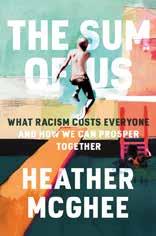
Bar Bulletin - December 28, 2022 - Volume 61, No. 24 11
• Attending a CLE webinar on Succession Planning on October 12, 2022 Contact the State Bar Professional Development Program at 505-797-6079 or the State Bar Regulatory Programs at 505-797-6059. Visit www.sbnm.org/successionplanning for sample plans and resources.
Est. 1886
Hearsay
Abby Bannon-Schneebeck has joined Modrall Sperling’s Albuquerque office, focusing predominantly on employment matters, personal injury claims, product liability cases and commercial disputes. She received her undergraduate degree in Political Science at Trinity University and attended the UNM School of Law. She also worked on the New Mexico Civil Rights Commission.

Jeremy Nickell has joined Modrall Sperling’s Albuquerque office, focusing on matters involving real estate, tax, commercial transactions and creditor’s rights. Prior to receiving his J.D. from While attendingSMU Dedman School of Law, where he received his J.D., Jeremy served as the Air Law Symposium Managing Editor for the SMU Law Review Association
Felecia N. Cantwell , a lawyer with Sutin, Thayer & Browne, has joined the H. Vearle Payne Inn of Court, practicing in the areas of civil litigation, regulatory and administrative law, employment and contested probate matters. Prior to joining Sutin, she worked in private practice and also served as a Trial Attorney for the Office of the Second Judicial District Attorney.
U.S. News & World Report and Best Lawyers have named Giddens + Gatton Law, P.C., a 2023 Best Law Firm for four practice areas – Real Estate Law, Bankruptcy and Creditor Debtor Rights/Insolvency and Reorganization Law, Commercial Litigation and Litigation – Bankruptcy. Giddens + Gatton Law, P.C., has a staff of three attorneys who practice in the areas of bankruptcy, creditor’s rights, business law and real estate law.

Jeffrey H. (Jeff) Albright of JAlbright Law, LLC has been recognized for inclusion in the 2023 edition of The Best Lawyers in America for professional excellence for his work in Administrative/Regulatory Law, Environmental Law and Litigation-Environmental Law. Jeff has been listed as a Best Lawyer in America each year since 2008.
Gallagher & Kennedy has been included in the 2023 edition of Best Lawyers in America and its list of “Best Law Firms,” which recognizes exceptional law firms for professional excellence with persistently impressive ratings from clients and peers. On the list, Gallagher & Kennedy earned six national rankings, 36 Phoenix metropolitan rankings, and three Santa Fe rankings.
www.sbnm.org
Chandler Farnworth has joined Modrall Sperling’s Albuquerque office, where she practices in the firm’s Natural Resources Department, assisting clients on a range of renewable energy project challenges. Chandler served as a judicial clerk for Judge J. Miles Hanisee of the New Mexico Court of Appeals. She received her J.D. from Tulane University School of Law and served as President of Tulane Women in Law.
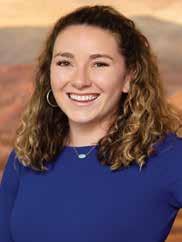
Wade L. Jackson, a shareholder with Sutin, Thayer & Browne, has been accepted as a member of the New Mexico chapter of NAIOP, the North American Commercial Real Estate Development Association. Jackson is practice group lead of the firm’s commercial group, practicing in areas including real estate, business, economic development, public finance and tax incentives and state and local government law.


Bardacke Allison LLP is pleased to welcome Billy Trabaudo as an associate. In 2022, he graduated in the top five of his class at the University of New Mexico School of Law. Billy handles complex commercial litigation, intellectual property and transactions in the entertainment and technology sectors. Billy is also a stage manager, director and theater producer, having over fifty credits as a stage manager.
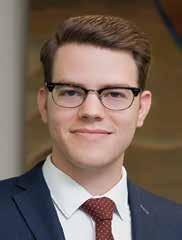
Attorney Elizabeth “Liz” Friedenstein has joined Giddens + Gatton Law, P.C., according to George “Dave” Giddens, founding shareholder of the firm. Friedenstein graduated from the University of New Mexico with a Bachelor of Arts in Political Science before attending the Oklahoma City School of Law, where she earned her Juris Doctorate and Certificate in Business Law in 2010.
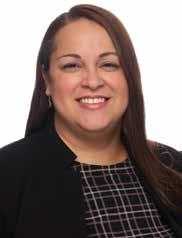
Regional law firm Sommer Udall is swapping its downtown Santa Fe location of 42 years for a prominent office building at 2000 Old Pecos Trail. Since its inception, the firm has earned several recognitions, including a Best Lawyers 2022 Lawyers of the Year award. The practice serves individuals, businesses and banking institutions in the areas of estate planning, probate, real estate and mediation and arbitration. Sommer says they are currently exploring options to expand and invite new specialized attorneys to the team.

12 Bar Bulletin
- December 28, 2022 - Volume 61, No. 24
Brian D. Escobedo was born in Yuma, AZ to Albert Escobedo and Norma Jean Norris (Shellhorn) of Catron County. A proud 1976 graduate of the University of Notre Dame, he was commissioned a 2Lt in 1976 and had a distinguished career as a Counter-Terrorism officer in the USAF and retired from the USAF Reserves with 27 years of service. Activated after 9/11, he was part of a team at HQ European Command that led to the capture of the infamous shoe-bomber in the UK. During his USAF Reservist career, he was a talented NM attorney-at-law, supporting female immigrant victims of domestic violence and later became involved in working anti-human trafficking legislation for the state of New Mexico. He liked to say, “I’m New Mexican by choice.” when the USAF took him to Albuquerque, NM in 1993. He served as a Deacon for 10 years at Our Lady of Perpetual Help Byzantine Catholic Church. On June 9, 2013, his lifelong dream was realized when he was ordained to the Priesthood in the Byzantine Catholic Church under the leadership of +Bishop Gerald Dino. During his 9 years as a priest was assigned to his home parish in Albuquerque for a year, to Holy Angels in San Diego, CA, and to Holy Protection in Denver, CO. He is survived by his wife of 42 years, Pani Janet Escobedo, Lt Col, USAF Retired, his three children, Sara and her husband John Byrom, Rachel and her husband Nick Renecle and their son Maverick, and Douglas and his wife Brittany and their children Connor, Elizabeth, and Thomas. He also leaves behind his beloved sister, Heather her husband Andrew and their children Isabella, Gabriel, Annalisa and his sister-in-law Pamela James and children Jacqueline and Robert.
Salvador C. Ramirez wanted to practice law until the day he died. He was a music lover, a voracious reader, a bit of a grump and a fierce defender of loved ones and clients alike. Sal lived a remarkable life. He was born in 1936 in a small town in Chihuahua, Mexico before his family moved north so his father could work the railroads in El Paso. As a young boy, Sal had a hard time adjusting to life in Texas. He struggled in school, eventually dropping out to join the US Air Force in 1954. He became a US citizen and received his high school equivalency at Chitose Air Base in Hokkaido, Japan where he worked as a radar operator. After an honorable discharge, Sal took advantage the GI Bill and enrolled at Texas Western College, where he earned an undergraduate degree in English Literature. Always up for an adventure, Sal volunteered with the newly formed Peace Corps, teaching English in the Dominican Republic. He returned to El Paso to work on a graduate degree and that is when he met the love of his life and wife of 53 years, Armida Lopez Ramirez. Together they moved to the San Francisco bay area where his son Gabriel was born. He taught Spanish at the University of California Berkeley and attended law school its prestigious Boalt Hall. After law school, the family moved to New Mexico where Sal and Armida had a daughter, Paloma, before returning to El Paso and settling down. Sal was a righteous practitioner of the law. Working out of a small house on Montana Avenue, he defended clients in a jam and helped immigrants trying to follow in his footsteps. In his final days he continued to consult with his last few clients from his hospice bed. They knew he wouldn’t be able to finish their cases and had been referred to new lawyers, but they still wanted to see him until the end. Sal was loved by those who knew him. He was funny and generous and loved to travel. When he wasn’t reading The New Yorker or The Economist he enjoyed good conversation and spending time with his grandchildren, his late brother Jesus, his surviving siblings Juan, Manuel and Lola, and all his nephews and nieces. Sal is survived by his wife Armida,
his son Gabe, his daughter Paloma, his daughter-in-law Stefani and his grandchildren Benjamin and Sophie. He died on May 8th after struggling with a long illness. He practiced law until the end.
Allen Linn Williamson, 47, of Runaway Bay, passed away on Saturday, May 14, 2022, at Decatur, Texas. Memorial Service will be held 10:30 a.m. Thursday, May 19, 2022, at First Baptist Church in Decatur. Family will receive friends 6 - 8 p.m. on Wednesday at Hawkins Funeral Home in Bridgeport. Allen was born on Oct. 30, 1974, in Hobbs, New Mexico, to Dan and Elizabeth Williamson. He graduated from Hobbs High School in 1993, where he was elected State Student Body President. Allen met Mendee Gunn in 2nd Grade in Hobbs, they started dating their senior year of high school, and they married in 1995 in Hobbs. Allen received a Bachelor of Arts degree in Speech Communication from Texas A&M University in 1996. Allen later received his Doctor of Jurisprudence degree from Texas Wesleyan University (now Texas A&M School of Law) in 1999, where he served on Law Review. Allen was a founding partner in the law firm of Boyd Powers & Williamson, with offices in Decatur, Fort Worth and New Mexico. Allen was a litigator, practicing law for 22 years, and licensed in Texas, New Mexico, and Oklahoma. Allen zealously represented clients all across Texas and the United States, handling both civil and criminal cases, and representing both plaintiffs and defendants. Although Board Certified in Criminal Law by the Texas Board of Legal Specialization and the National Board of Trial Advocacy, Allen recently focused his trial practice on civil cases, with an emphasis on complex commercial and personal injury and wrongful death litigation. Allen was a highly skilled trial attorney who had a unique gift of effectively and passionately communicating his client’s position, yet always treating both co-counsel and opposing counsel with the utmost respect and courtesy. Before founding Boyd Powers & Williamson, Allen was the First Assistant District Attorney for the 271st Judicial District Court, covering Wise and Jack Counties. Allen was recognized by Thompson Reuters on the Texas Super Lawyers list from 2013 to the present, and prior to that was on the Texas Super Lawyers Rising Stars list from 2011 to 2013. Allen was a member of the American Board of Trial Advocates and was serving as President-Elect of the Fort Worth Chapter of ABOTA. Allen previously served on both the Pattern Jury Charge Committee and the Professionalism Committee of the State Bar of Texas. Allen was also dedicated to serving his community. He served on the Wise Health Foundation and other community groups. Allen was also elected and diligently served as the Republican Chairman of Wise County from 2008 – 2018. Allen was a faithful member of Grace Fellowship. He was a passionate Christian, a devoted husband, a loving father, and a true friend to countless people. Allen possessed an infectious personality, demonstrating a sense of genuine connection and fellowship with everyone with whom he came in contact. If you met Allen, you met a friend for life – and Allen always made time to visit with and care for his friends. He was loved and respected by a multitude of people. His smile and warm heart always made you feel special, and his boisterous sense of humor and ability to share one funny story after another was unmatched. Survivors include his wife, Mendee Williamson of Runaway Bay; children, Jessica, Amber, and Aaron Williamson of Runaway Bay; mother, Elizabeth Williamson of Runaway Bay; and brother, Russ Williamson and his husband, Shawn McCalister, of Dallas. Allen was preceded in death by his father, Dan Williamson.
Bar Bulletin - December 28, 2022 - Volume 61, No. 24 13
In Memoriam www.sbnm.org
State Bar of New Mexico Est. 1886
Equity in Justice

Ask Amanda!
Do you have specific questions about equity and inclusion in your workplace or in general?
Send in anonymous questions to our Equity in Justice Program Director, Dr. Amanda Parker. Each month Dr. Parker will choose one or two questions to answer for the Bar Bulletin. Go to www.sbnm.org/eij, click on the Ask Amanda link and submit your question. No question is too big or small!
14 Bar Bulletin - December 28, 2022 - Volume 61, No. 24
at www.sbnm.org SBNM
Listen
is Hear haveWea podcast!
Advance Opinions
From the New Mexico Supreme Court and Court of Appeals
From the New Mexico Court of Appeals
Opinion Number: 2022-NMCA-027 No: A-1-CA-37827 (filed March 15, 2021)
ELIZABETH WALLBRO, Personal Representative of the ESTATE OF MARY Y.C. HAN, Deceased, Petitioner-Appellee/Cross-Appellant, v.
KURT NOLTE, M.D., in his official capacity as Chief Medical Investigator of the Office of the Medical Investigator, Respondent-Appellant/Cross-Appellee.
APPEAL FROM THE DISTRICT COURT OF SANTA FE COUNTY
David K. Thomson, District Judge
Certiorari Denied, April 19, 2022, No. S-1-SC-38773; Released for Publication June 21, 2022.
Serra & Garrity, P.C. Diane Garrity Santa Fe, NM
Vega Lynn Law Offices, LLC Rosario D. Vega Lynn Albuquerque, NM for Appellee
OPINION
MEDINA, Judge.
{1} In these consolidated appeals, Kurt Nolte, M.D., in his official capacity as Chief Medical Investigator of the Office of the Medical Investigator (Respondent) appeals the district court’s grant of a writ of mandamus directing Respondent to amend its manner of death determination on a death certificate for decedent Mary Y.C. Han (Han). Elizabeth Wallbro (Petitioner), sister and personal representative of the Estate of Han (Han Estate), appeals the district court’s denial of attorney fees pursuant to the issuance of the writ of mandamus. We reverse the district court’s grant of a writ of mandamus and affirm its denial of attorney fees.
BACKGROUND
{2} In November 2010, personnel from the Albuquerque Fire Department and officers of the Albuquerque Police
Melendres & Melendres, P.C. Paul Melendres Linda Melendres Albuquerque, NM for Appellant
http://www.nmcompcomm.us/
{4} After completing its field investigation, Respondent conducted an autopsy and concluded that Han’s manner of death was suicide caused by inhalation of carbon monoxide in the enclosed garage. On December 23, 2010, Dr. Ross Reichard, the forensic pathologist who performed Han’s autopsy, certified that “[on] the basis of examination and/or investigation, in [his] opinion,” the manner of Han’s death was suicide. Wallbro, acting as personal representative of the Han Estate, disputed Respondent’s manner of death determination and filed a petition for a writ of mandamus requesting in part and in the alternative that the district court:
A. Issue a writ of mandamus requiring [Respondent] to conduct a proper, fair, impartial and complete investigation into the cause and manner of the death of . . . Han;
B. Order that the cause and manner of death of . . . Han be reopened, reexamined and reevaluated . . . . [or]
D. Order that the death certificate be amended to “undetermined” as the manner of the death of . . . Han.
Department (APD) responded to a call and located the body of Han in the driver’s seat of a vehicle inside the garage of her home. After securing the garage, officers entered the house to ensure no other individuals were inside and immediately noticed strong vehicle exhaust fumes throughout.
{3} The officers then spoke with Paul Kennedy who discovered Han inside her vehicle and was still at the scene when they arrived. After speaking with Mr. Kennedy, Officers took a visual inventory of the scene and then called a field investigator1 and Respondent. Before the field investigator or Respondent arrived on scene, two other officers arrived and began walking through the house and garage. More individuals—including high ranking APD officers and civilians—arrived throughout the course of the field investigation. In total, approximately fifty to sixty officers and civilians were on scene and moving between the house and garage during Respondent’s investigation.
{5} The district court did not issue a writ. Instead, the court issued a summons. Respondent in turn filed a motion to dismiss asserting that Petitioner failed to demonstrate “(1) . . . standing to bring this action; (2) [that] Respondent has a clear legal duty to perform what is requested; (3) the performance sought is ministerial and not discretionary; and (4) a writ is an appropriate remedy.” Petitioner filed a response to the motion to dismiss and Respondent filed a reply.
{6} The district court denied Respondent’s motion to dismiss, finding that: (1) “Petitioner does not have a plain, speedy and adequate remedy in law”; (2) “Petitioner is beneficially interested based on the allegations contained in the [w]rit”; and (3) “there exists a material question and a mixed question of law and fact as to what . . . Respondent’s discretionary acts are as raised in the [p]etition.”
{7} Respondent subsequently filed a motion for summary judgment, asserting that mandamus cannot lie because there were no material issues of fact in dispute regarding the discretionary nature of the relief sought by Petitioner. The district court denied the motion, and in its order stated that questions regarding the nature of Respondent’s duty and whether there exists an adequate remedy of law were issues of fact for trial. The
1 Field investigators specialize in documentation and collection of evidence including taking photos and processing the scene for fingerprints.
Bar Bulletin - December 28, 2022 - Volume 61, No. 24 15
⁵
Advance Opinions
district court further stated that Petitioner’s experts’ opinions on Respondent’s protocols and whether the protocols were followed during Han’s autopsy were also disputed issues of fact for trial.
{8} The district court held two evidentiary hearings on the petition. The purpose of the first hearing was to determine whether Respondent’s “actions or duties raised in the [p]etition [were] mandatory and/or ministerial or whether they [were] discretionary.” Six witnesses testified during the first hearing including Dr. Werner Spitz, Dr. David Williams, Dr. Kris Sperry, Dr. Ross Zumwalt, Dr. R. Ross Reichard by deposition, and Respondent.
{9} Petitioner presented the testimony of Dr. Spitz, who was accepted as an expert in forensic pathology. Dr. Spitz testified that the word “opinion” in the certified statement on Han’s death certificate meant that it was “the opinion of the person that sign[ed] this document . . . what he or she believed, to the best of their knowledge, based on ground rules, medical and forensic, to be the cause and manner of death.” Dr. Spitz noted that there were deficits in the investigation such that, in his opinion, Han’s manner of death should have been classified as undetermined. Of great significance to Dr. Spitz was Respondent’s failure to collect and analyze Han’s computer.2 According to Dr. Spitz, “many times” people leave suicide notes or other information on their computers.
{10} Dr. Williams testified as an expert in emergency medicine and carbon monoxide toxicity as it applies to the clinical analysis of a manner or cause of death; he conceded, however, that he lacked the credentials to offer an opinion as to autopsy procedure. Dr. Williams explained why, after meeting with Respondent, he made a formal appeal of the Office of the Medical Investigator’s (OMI’s) findings in this case. Specifically, he stated that he found it odd that the autopsy did not reveal tissue or organ damage given the level of carbon dioxide in Han’s system. Dr. Williams also described an instance in which he identified the manner of death on a death certificate as accidental and natural and affirmed that he refused OMI’s request to delete “accidental” because it was his medical opinion that both applied.
In addition, he confirmed that he would refuse a judicial directive to change a manner of death determination if it was inconsistent with his opinion.
{11} Dr. Sperry, accepted by the district court as an expert in forensic pathology, disagreed with OMI’s determination of Han’s manner of death. Specifically, Dr. Sperry took issue with deficits in the investigation such as the lack of investigation into Han’s computer. He explained that forensic pathology relies on parallel investigations to garner information beyond what is found through autopsy and toxicology. Still, Dr. Sperry agreed that a forensic pathologist must use discretion when determining manner of death and that cause and manner of death are statements of opinion.
{12} In addition to the experts testifying at trial, the deposition testimony of Dr. Reichard was admitted as an exhibit. Dr. Reichard testified that he performed Han’s autopsy and that his determination of suicide as the manner of death was a matter of opinion rendered to a reasonable degree of medical certainty.
{13} At the conclusion of the first hearing, the district court entered an order in which it concluded in part that Petitioner is a beneficially interested party because the estate has a quasi-due process right in Han’s body;3 consistent with its regulations, Respondent had a nondiscretionary duty to issue a death certificate for the cause and manner of a person’s death; and “[a]t the very least [Respondent] has a ministerial duty to correctly analyze and determine the cause of death based on alleged facts of death.” Having found that Respondent’s determination of manner of death is a ministerial act, the district court held a second hearing to determine whether Respondent determined the manner of death in accordance with its ministerial duties.
{14} During the second hearing, APD officers described the investigative scene and testified that members of the public as well as other high ranking APD and city officials inundated the scene. Testimony revealed that some evidence was not collected during the investigation and that the scene was otherwise compromised.
http://www.nmcompcomm.us/
{15} Based on the evidence at both hearings, the district court concluded that Respondent acted arbitrarily and capriciously and not in accordance with law because substantial evidence did not support its conclusion as to manner of death and therefore Respondent abused his discretion. In concluding that Respondent’s determination of manner of death is a ministerial act, the district court relied on NMSA 1978, Section 24-14-21(A) (1981), of the Vital Statistics Act to find that Respondent had a duty to “apply the facts surrounding the death of Ms. Han in a manner and in accordance with evidentiary requirements.” The district court then found that the spoliation of evidence at the scene impacted Respondent’s ability to satisfy the evidentiary requirement of Section 24-1421(A).⁴ The district court applied the standard of review for administrative decisions and found that Respondent abused its discretion because “its conclusions of manner of death lacks foundation, a reasonable basis in fact, and is arbitrary and capricious.”⁵ Having found that Respondent’s manner of death determination was arbitrary and capricious, the district court ruled that “[a]pplication of [m]andamus is appropriate due to the fact that a clear abuse of discretion has occurred.” The district court ultimately determined that because of the evidentiary issues raised, “only a conclusion of ‘undetermined’ is factually and legally supported.”
{16} Consequently, the district court issued a peremptory writ of mandamus directing Respondent to “amend the [d]eath certificate for . . . Han to change the manner of death from ‘suicide’ to ‘undetermined’ ” and denied Petitioner’s request for attorney fees. Respondent and Petitioner each filed separate appeals, which we consolidated.
DISCUSSION
{17} Whether the district court appropriately granted the writ of mandamus directing Respondent to amend the death certificate informs our review of Petitioner’s appeal of the denial of attorney fees. For this reason we first evaluate the propriety of the writ of mandamus and then the district court’s denial of attorney fees.
Mandamus
{18} Mandamus proceedings are technical in nature and strictly regulated by statute.
2 At the scene, Mr. Kennedy described the laptop as his firm’s property and asked for its return. At the direction of Deputy Chief Banks, an officer handed the computer to Mr. Kennedy who walked away with it.
3 The district court relied on Geiges v. Rosko, 49 Pa. D. & C.3d 61 (Pa. Com. Pl. 1987). In Geiges, the Pennsylvania court acknowledged, “the special rights of the next of kin regarding a decedent’s remains. These rights include custody of the body, control of the burial and the right to contest an exhumation and/or autopsy.” Id. at *65 (citations omitted).
⁴ Section 24-14-21(A) states that “[t]he certificate shall be registered subject to evidentiary requirements as prescribed by regulation to substantiate the alleged facts of death.” However, applicable sections of the New Mexico Administrative Code do not set out specific evidentiary requirements. See 7.3.2.11 to .13 NMAC.
As we understand the record, the district court applied its whole record review in part to determine whether Respondent relied on sufficient evidence to overcome a presumption against suicide articulated in Solorzano v. Bristow, 2004-NMCA-136, ¶ 10, 136 N.M. 658, 103 P.3d 582. In Solorzano this Court considered suicide as a defense to a wrongful death claim. Id. ¶ 14. In that context this Court held that suicide should be treated as an affirmative defense requiring some proof of intent. Id.
- December 28, 2022 - Volume 61, No. 24
16 Bar Bulletin
Advance Opinions
See Kerpan v. Sandoval Cnty. Dist. Att’ys Off., 1988-NMCA-007, ¶ 6, 106 N.M. 764, 750 P.2d 464 (observing that “[m]andamus proceedings are technical in nature”). The statutes regulating mandamus proceedings can be found at NMSA 1978, Sections 44-2-1 to -14 (1884, as amended through 1899). See § 44-2-1 (stating that a “writ of mandamus is regulated as prescribed [by Chapter 44, Article 2]”). Section 44-2-5 provides that a “writ shall not issue in any case where there is a plain, speedy and adequate remedy in the ordinary course of law. It shall issue on the information of the party beneficially interested.”
{19} The purpose of mandamus is “to compel a public officer to perform an affirmative act where, on a given state of facts, the public officer has a clear legal duty to perform the act and there is no other plain, speedy, and adequate remedy in the ordinary course of the law.” Mimbres Valley Irrigation Co. v. Salopek, 2006-NMCA-093, ¶ 11, 140 N.M. 168, 140 P.3d 1117. A writ of mandamus “may be issued to any inferior tribunal . . . to compel the performance of an act which the law specially enjoins as a duty resulting from an office[.]” Section 44-2-4. A writ of mandamus, however, will not lie to control discretion lawfully vested in the official functions of a state official. See Territory ex rel. Castillo v. Perea, 1900-NMSC-026, ¶ 12, 10 N.M. 362, 62 P. 1094 (“It is not the province of a writ of mandamus to control the discretion of an officer, where a discretion is vested in him.”); El Dorado at Santa Fe, Inc. v. Bd. of Cnty. Comm’rs, 1976-NMSC-029, ¶ 5, 89 N.M. 313, 551 P.2d 1360 (holding that mandamus is not appropriate to “direct the performance of the particular act from among two or more allowed alternatives”). “Mandamus is a drastic remedy to be invoked only in extraordinary circumstances.” Brantley Farms v. Carlsbad Irrigation Dist., 1998-NMCA-023, ¶ 12, 124 N.M. 698, 954 P.2d 763. {20} There are two requirements for mandamus to issue: (1) “the petitioner must establish a clear legal right to the performance of the duty sought to be enforced”; and (2) “the act to be compelled must be ministerial constituting a nondiscretionary duty which the respondent is required to perform.” Kerpan, 1988-NMCA-007, ¶¶ 9, 10. “A ‘ministerial duty’ arises only when the law directs that a public official must act when a given state of facts exists.” Mimbres Valley Irrigation Co., 2006-NMCA-093, ¶ 11. Acts and duties performed by a public official “are no less ministerial because the public official, upon whom the duty is enjoined, may have to satisfy himself as to the existence of facts necessary to require his action[.]” El Dorado at Santa Fe, Inc., 1976-NMSC029, ¶ 5. However, when a public official
refuses to act after such a determination is made, mandamus is the proper remedy and mandamus will issue to compel acts committed to their discretion if the law requires them to act. Id. Conversely, “ ‘[d] iscretion’ . . . has been defined as the power or right conferred upon an individual to act according to the dictates of one’s own judgment and conscience.” Kerpan, 1988NMCA-007, ¶ 14.
{21} “[T]he grant or denial of a petition for writ of mandamus is reviewed for an abuse of discretion.” State ex rel. Stapleton v. Skandera, 2015-NMCA-044, ¶ 5, 346 P.3d 1191. “A district court abuses its discretion if its decision is contrary to logic and reason, or if it exceeds the bounds of reason, all the circumstances before it being considered.” FastBucks of Roswell, N.M., LLC v. King , 2013-NMCA-008, ¶ 7, 294 P.3d 1287 (internal quotation marks and citations omitted). “Within the abuse of discretion standard we consider whether the district court’s ruling rested on its determination that [Respondent] acted [outside of its] statutory authority and exercised [its] discretion under statute.” Stapleton, 2015-NMCA-044, ¶ 5. “That issue presented requires the interpretation of statutes. Thus, our review is de novo.” Id {22} We distill Respondent’s arguments into two dispositive issues: (1) whether petitioner had standing, and (2) whether mandamus can direct a particular discretionary finding. We address each in turn. Standing {23} Respondent asserts that the district court erred in granting standing to Petitioner. Specifically, Respondent argues that Petitioner is not a beneficially interested party in the death certificate and New Mexico jurisprudence does not expand “a cause of action based in tort, to encompass a quasi-due process right in the determination of manner of death[.]” Petitioner responds that the district court properly determined that she had standing because she has a quasi-property interest in Han’s body that extends to the manner of death determination on Han’s death certificate and thus is a beneficially interested party. We need not determine whether a quasi-property right in a dead body creates standing to challenge the manner of death determination on a death certificate because, even if we assume without deciding that it does, we hold that the district court erred in concluding that the determination of manner of death itself was a ministerial duty subject to mandamus. We explain.
Duty Clearly Enjoined by Law/Ministerial {24} Respondent contends the district
http://www.nmcompcomm.us/
court erred in finding that determinations on the manner of death are ministerial acts because such determinations are medical opinions. In support of this position, Respondent directs this Court to the language on “the death certificate itself”⁶ and testimony adduced during the hearing.
{25} “In determining whether mandamus will lie, the court must look to the purpose of the statutory scheme to discover whether the duty sought to be compelled is ministerial or discretionary.”
Kerpan, 1988-NMCA-007, ¶ 15. The Vital Statistics Act requires OMI to investigate, determine, and certify causes of death.
NMSA 1978, § 24-14-20(F) (2009). It states in pertinent part “[w]hen death occurs without medical attendance . . . the case shall be referred to the state medical investigator for investigation to determine and certify the cause of death.” Id.
{26} The use of the term “shall” in Section 24-14-20(F) indicates that the Legislature intended to impose a mandatory duty to refer deaths that occur without medical attendance to OMI, which must then conduct an investigation to determine and certify the cause of death. See N.M. Dep’t of Health v. Compton, 2000-NMCA-078, ¶ 11, 129 N.M. 474, 10 P.3d 153 (recognizing that “when the language of a statute is clear and unambiguous, it must be given effect by the courts” and in general “ ‘use of the word “shall” imposes a mandatory requirement’ ” (omission omitted)) (quoting Redman v. Bd. of Regents, 1984-NMCA-117, ¶ 17, 102 N.M. 234, 693 P.2d 1266); see also NMSA 1978, § 12-2A-4(A) (1997) (“ ‘Shall’ and ‘must’ express a duty, obligation, requirement or condition precedent.”); Mimbres Valley Irrigation Co., 2006-NMCA-093, ¶ 11 (explaining that a ministerial duty arises only when the law directs that a public official must act when a given state of facts exist). {27} OMI’s own regulations incorporate the duty to investigate, determine, and certify the cause of reportable deaths in 7.3.2.8 NMAC. Pursuant to this regulation of the Administrative Code, OMI is required in part to:
A. receive all reports of sudden, unexpected or unexplained deaths;
B. respond to all sudden, unexpected or unexplained deaths; . . . .
F. conduct an investigation leading to the determination of the cause and manner of death;
H.certify the cause and manner of death; forward written certification to designated agencies; . . . .
⁶ The certifying language on the death certificate states, “On the basis of examination and/or investigation, in my opinion this death occurred at the time, date and place due to the cause(s) and manner stated.”
24 17
Bar Bulletin - December 28, 2022 - Volume 61, No.
Advance Opinions
P. maintain records of each official death investigation and provide reports to official agencies.
7.3.2.8 NMAC (emphasis added).
{28} Regulation 7.3.2.13(B) of the New Mexico Administrative Code additionally provides that: The office of the medical investigator is responsible for the completion of the certificate in all deaths reported to that office in which jurisdiction is assumed. This certification is to the cause (the anatomic condition causing death) and the manner (accident, suicide, accidental, homicide). The cause and manner of death shall be finally determined by the designated pathologist, in accordance with the findings and recommendations of the district and deputy medical investigators.
{29} Based on the unambiguous language of Section 24-14-20(F) in addition to the OMI’s own regulations, we agree that Respondent’s duty to investigate, determine, and then certify the manner of death on a death certificate, is a ministerial one. Here, it is undisputed that OMI responded to a sudden, unexplained death at the Han residence, investigated, determined, and certified the cause and manner of Han’s death on the death certificate. In so doing, we conclude that Respondent fulfilled the ministerial duties identified in Section 21-14-20.
{30} However, the mandamus order in this case went beyond directing Respondent to fulfill the ministerial duties of investigating, determining, and certifying the cause and manner of death and ordered Respondent to change its medical opinion of the manner of death from “suicide” to “undetermined.”
This directive exceeded the proper bounds of mandamus because Respondent’s conclusion as to manner of death is not a ministerial act. Rather, based on the record before us, we hold that it is an opinion reached through the exercise of discretion.
{31} The certifying language on the death certificate states, “On the basis of examination and/or investigation, in my opinion this death occurred at the time, date and place due to the cause(s) and manner stated.” For example, Dr. Spitz testified that when a medical examiner identifies a manner of death on a death certificate, the examiner is not making a ruling but merely rendering an opinion to the Vital Statistics Bureau as to how the death should be statistically coded. Dr. Spitz explained that the classification of manner of death on a death certificate represents what the signator believes, to the best of the person’s knowledge, based on his or her education, medical training, experience in the field, and reasoning.
Similarly, Dr. Sperry testified that a forensic pathologist uses discretion when determining manner of death and that cause and manner of death are statements of opinion. Additionally, Dr. Williams noted that he once refused to change his manner of death determination on a death certificate because he believed he had an ethical obligation as a doctor not to change his opinion. And, Dr. Reichard testified that his determination of Han’s manner of death was an opinion based on a reasonable degree of medical probability.
{32} {32} We previously considered the difference between determinations of the manner of death and the cause of death when we addressed the admissibility of a death certificate to prove cause of death in Corlett v. Smith, 1988-NMCA-067, ¶¶ 2429, 107 N.M. 707, 763 P.2d 1172. This Court held that the cause of death determination in death certificates is a factual finding and therefore admissible under the vital statistics exception to the hearsay rule. In coming to the holding, we distinguished between determinations of cause of death and manner of death, recognizing that “[m] ost jurisdictions hold that death certificates are admissible as evidence of cause of death. Courts will not, however, readily admit death certificates as evidence of the manner of death, e.g., ‘suicide’ or ‘accidental,’ deeming that conclusion not a fact, but an opinion.” Id. ¶ 26. Our discussion in Corlett acknowledges the distinction between a factual finding and a determination that requires a degree of discretion, as was the case here.
{33} Based on the controlling statutory and regulatory language, further buttressed by the testimony of the medical experts, we conclude that Respondent’s determination as to the manner of death is a discretionary determination, in which mandamus cannot be used to direct a specific outcome. See Perea, 1900-NMSC026, ¶ 12 (observing that a writ of mandamus will not control the discretion of an officer where a discretion is vested in him or her); State ex rel. Castillo Corp. v. N.M. State Tax Comm’n, 1968-NMSC-117, ¶ 16, 79 N.M. 357, 443 P.2d 850 (stating that “the purpose of mandamus is to compel, not control”); El Dorado at Santa Fe, Inc., 1976-NMSC-029, ¶ 5 (observing that a writ of mandamus cannot be used to direct the performance of a particular act from among two or more allowed alternatives). Because New Mexico case law generally prohibits use of mandamus to control or interfere with the valid exercise of discretion by a state official, the issuance of the mandamus order in this case directing Respondent to change its medical opinion as to manner of death was error.
{34} To the extent the district court relied on out-of-state mandamus authority to review Respondent’s “suicide” opinion, contrary to our own New Mexico authority cited previously, we conclude the district court erred in doing so. New Mexico’s writ of mandamus relies on the New Mexico Constitution, state statute, and an abundance of jurisprudence from our Supreme Court stretching back over one hundred years. It is not for this Court to deviate from such clear direction. Given our New Mexico authority instructing that mandamus is inappropriate to direct a specific determination where the discretion to make that determination is vested in the public officer, we are reluctant to adopt a new approach to mandamus. See El Dorado at Santa Fe Inc., 1976-NMSC029, ¶ 5. However, we observe that legal avenues other than mandamus do exist to challenge administrative decisions for being arbitrary, an abuse of discretion, or unsupported by substantial evidence, but we express no opinion as to whether a writ of certiorari might have been appropriate in this case. See Rule 1-075 NMRA. {35} {35} Therefore, because Respondent’s determination of a decedent’s manner of death is an opinion amongst more than two options, i.e., undetermined, suicide, accidental, or homicide, there is no question the discretion to identify the manner of death is vested in Respondent. See 7.3.2.13(B) NMAC. We therefore hold that the district court abused its discretion in directing Respondent to amend the manner of death from “suicide” to “undetermined.”
Attorney Fees
{36} Petitioner appeals the district court’s denial of attorney fees arguing in part that this Court should apply a public policy exception to the American Rule dictating that, absent statute or rule of court, parties are responsible for their own litigation costs. Petitioner also argues that this Court should expand awards of attorney fees as damages in civil litigation cases where public policy is at issue. However, Petitioner’s arguments necessarily require that Petitioner be the prevailing party. Because we conclude that the district court improperly granted mandamus in this case and reverse the court’s peremptory writ, Petitioner is not a prevailing party; thus, we do not address these arguments.
CONCLUSION
{37} For the foregoing reasons we reverse the peremptory writ of mandamus and affirm the denial of attorney fees.
{38} IT IS SO ORDERED.
JACQUELINE R. MEDINA, Judge
WE CONCUR: KRISTINA BOGARDUS, Judge RICHARD C. BOSSON, Judge Pro Tempore
18 Bar Bulletin
- December 28, 2022 - Volume 61, No. 24 http://www.nmcompcomm.us/

December 2022 Volume 17, No. 4 www.sbnm.org
—State Bar of New Mexico Intellectual Property Law Section—
Intellectual Property Law

2 New Mexico Lawyer - December 2022
Are New Art Forms Free for the Taking?
By Ben Allison and Breanna Contreras
Immersive art experiences have taken the art world by storm in recent years, attracting millions of non-museum-goers to exhibits like SuperBlue, OmegaMart and Seismique. But, as immersive art becomes successful and proliferates, questions of protecting it against copying arise. Technology-driven, participant-influenced, mixed-reality experiences can stretch traditional concepts of what copyright protects. One recent immersive art experience, the Museum of Dream Space (“MODS”) in Los Angeles, owned by a Chinese company, openly admits it was inspired by exhibits by Japanese art collective teamLab. Unsurprisingly, teamLab calls this infringement.
teamLab’s original exhibit Boundaries, which opened at Pace Gallery in London in 20171, is on the left. MODS’ Season Dream exhibit, which opened the following year in LA, is on the right:

Both works involve a waterfall of light particles with multicolored flowers behind the waterfall on the walls and floors. In both cases, the water and flowers interact and respond based on a participant’s presence and movements. In Boundaries, when a person stands on the “water,” the person becomes an obstacle for the water, as though a rock were blocking its flow, and the flowers underneath begin to bloom.


MODS did not stop there. It exhibited a second work, Galaxy Dream, inspired by teamLab’s original work Crystal from years earlier: teamLab describes its work as “an accumulation of light points to create a sculptural body, similar to the way distinct dots of color form an image in a pointillist painting.” teamLab chose its specific orientation of lights within the room, primarily purple and blue colors, specific blinking patterns for the lights, and mirrors and reflective floor and ceiling surfaces to convey an illusion of infinite

New Mexico Lawyer - December 2022 3
Boundaries, by teamLab
Crystal, by teamLab Galaxy Dream, by MOD
Season Dream, by MOD
lights. teamLab created a computer algorithm to control the display of the LED lights as well as a smartphone app that can be used by viewers to create further changes to the light display.
MODS’ Galaxy Dream copied the arrangement of lights used by teamLab, used similar purple and blue colors, similar blinking patterns, and mirrors and reflective floor and ceiling surfaces as in Crystal


MODS admitted it was inspired by teamLab. In response to a social media comment, MODS wrote: “Hi there, we were really inspired by TeamLab exhibit and a lot our installations look similar. We also used it before to show how pretty their museum is and that we would love to bring this experience to USA.” MODS went further and actually copied images of teamLab’s exhibit to promote MODS’ own exhibit:

MODS also copied text verbatim from teamLab’s website to promote Galaxy Dream. teamLab’s website:


Later, MODS’ website published the following copy:

4 New Mexico Lawyer - December 2022
teamLab’s exhibition MODS’ advertisement
continued on page 10
Brave New World:
NFTs, Cryptocurrency and More
By Svitlana Anderson, Gina Constant and Christian Pezalla
As the world goes virtual, so too must the craze of the day. Having survived the Pog and Beanie Baby pandemics, it is hard not to see history repeating itself with non-fungible tokens, better known now as NFTs. These digital creations have spread quickly throughout not only the digital world but the real-world economy as well, collecting hard currency along the way. What are NFTs and what is their purpose, if any?
A non-fungible token is a non-interchangeable unit of data (token) stored on a blockchain, a form of digital ledger, that can be sold and traded because of its unique characteristics. Because all NFTs are one of a kind, their ownership is easily identified, incontestable and guaranteed by blockchain technology. NFTs can be digital (pictures, GIFs, songs, videos) and tangible (deeds, tickets, legal documents and many more). If you create an NFT (sometimes referred to as “minting”), your status as the creator and owner is verified. You even can earn royalties with every subsequent transfer through Smart Contracts.

The presence of the NFT certifies that the web object, such as digital art, is unique and therefore not fungible, which means not interchangeable with some other digital file. Other people can view a copy of the work, but only the work with the NFT is the original. Therefore, the original work of digital art is non-fungible and has value because of that exclusivity.
For comparison, the Mona Lisa is one of the most valuable paintings in the world. Its provenance (the history that proves its authenticity) can be traced back to Leonardo da Vinci’s creation of it, and thus there is little doubt that the painting hanging in the Louvre is the one that da Vinci himself painted. Today, a very talented painter could create a copy of the Mona Lisa that would look exactly like the original (to a non-trained eye, anyway). But, that copy would be worth almost nothing compared to what the original is worth. That’s because no one would believe the copy was
the original – we all know the original is in the Louvre. The provenance of the painting hanging in the Louvre makes that painting non-fungible, i.e., it is not interchangeable with any copy created today.
Similarly, an NFT makes a digital piece of art worth far more than any copies. It is like a certificate of authenticity and ownership that increases the value of the work. In some cases, the value of the NFT is the NFT itself, such as the NBA’s “Top Shot moments” series of NFTs, which are similar to collectable sports player cards. In other cases, the NFT itself functions merely as a certificate of authenticity and ownership for something in the real world, such as a painting, automobile, aircraft or even a house.
Some companies are using NFTs to commodify assets, build their brands and combat counterfeits already. Nike, for instance, is using its CryptoKicks to ensure authenticity of genuine pair of shoes by assigning a cryptographic token to signify the shoe’s ownership and to create additional brand value.
However, the most lucrative cryptocurrencies use an energy-intensive process called proof-of-work to validate transactions. That requires significant computing power, and therefore large amounts of electricity. In response, the private sector-led initiative, the Crypto Climate Accord, was
New Mexico Lawyer - December 2022 5
continued on page 7
Does An Employer Own the Intellectual Property Created for Them by an Employee or Independent Contractor?
 By Gina Constant
By Gina Constant
The term “intellectual property” refers to intangible property of the mind as opposed to property we can touch and feel, like cars and real estate. Employees and independent contractors may create intellectual property for others as part of their employment or contract terms (whether express or implied). Who owns that intellectual property? The law is fairly clear as to ownership of copyrightable works, trademarks, patents and trade secrets. But, there are other forms of intellectual property that are not covered by statutes and case law that are more difficult to protect.
Copyrights
If you are an employee and you create copyrightable works within the scope of your employment and on your employer’s dime, then the employer owns the copyrights under the Work for Hire doctrine. The employer is considered the author of that work. If you are an independent contractor creating the copyrightable work, then you are the author and owner unless there is a written agreement stating otherwise, i.e., a contract expressly stating that the employer owns the copyrights in your work.
Patents
Inventions are subject to the Hired to Invent doctrine, which means if an employer hires an employee to invent something and the employee does so, then the employee must assign any resulting patent rights to the employer. Independent contractors own their patents unless there is an agreement otherwise. The agreement doesn’t have to be in writing but, of course, you must prove it exists if you want to enforce it. In other words, the agreement to assign the patent to the employer can be a verbal agreement, not a written one. But, that often leads to a he-said-she-said situation: one side saying there was a verbal agreement and the other side saying there wasn’t. So, if one party to a verbal contract
wants to enforce their rights, they need to prove the verbal agreement existed, perhaps by supporting emails, voicemails or witnesses.
Trade Secrets
Trade secrets created, or simply known, by employees or independent contractors (it doesn’t matter which) belong to the employer provided that the employer (1) takes reasonable steps to maintain their secrecy and (2) there is economic value to keeping them secret. These are things the employer’s competitors would love to know but because they are kept secret the employer has an advantage in the marketplace. Trade secret misappropriation is where an employee or independent contractor knowingly takes the company’s trade secrets and then competes with the company, whether on their own or by working for or with a competitor of the company. However, a former employee may use the general knowledge, skills and experience acquired during their prior employment to compete with a former employer. So, the center of a trade secret misappropriation dispute often revolves around whether the information taken was a “trade secret” or simply the ex-employee’s acquired “general
6 New Mexico Lawyer - December 2022
knowledge, skills, and experience.” Finally, trade secret misappropriation is governed by statute. Almost every state has adopted some form of the Uniform Trade Secrets Act. There is also a federal statute, the Defend Trade Secrets Act, which was enacted in 2016. The statutes generally include damages multipliers and attorneys’ fees for willful conduct.
Trademarks
A trademark (a word mark or a logo) belongs to the entity that is using the mark in commerce. So, absent an agreement to the contrary, the company that is selling goods and services under the mark owns all rights to the mark, regardless of who created it. The exception would be where there is an agreement, probably a license agreement, stating that one person has created the trademark logo and gives the company the right to use it, usually in exchange for a fee. The license agreement should be in writing and here’s why: If a company hires a graphic designer to create a logo without a written agreement, the company has an implied license from the graphic designer to use the mark and logo. However, the implied license is non-exclusive so the graphic artist would be free to license the logo to another entity. Avoid that kind of confusion by getting a written agreement clearly stating who owns the logo design after it is created.
Other IP:
There can be other intangible property that employees and independent contractors create for employers. It may be referred to as generic “intellectual property” or “know-how.” There is no actual tort called “Intellectual Property Theft,” although the term gets bandied around as a threat when none
of the legal protections above are available. But, if a lawsuit for intellectual property theft is filed, it would probably be characterized and treated as a claim for ordinary negligence.
Ordinary negligence happens when a reasonable person would have foreseen that their acts would create an unreasonable risk of injury to another person or their property. All of us have a duty to exercise ordinary care for the safety of other people and their property, including their intellectual property. For example, say an employer brings on an employee or contractor to take the lead in starting up a business and promises, in a handshake deal, profit-sharing in return. If the employer then lets the employee create the concepts, assemble the team, approve the logo design, use their industry contacts to generate buzz, etc., and then fires them as soon as the business becomes profitable, that could be negligence. In other words, the employer should have exercised ordinary care for the employee’s intangible contributions and not stolen it from them instead. This is a situation where the other intellectual property protections discussed above are difficult to apply but you know instinctively that the employer shouldn’t have done that. An ordinary negligence claim may be the best, or even only, way for the employee or independent contractor to seek a remedy for the wrongful conduct of the employer.
Gina T. Constant is a sole practitioner with Constant Law, LLC. She brings 20 years of professional experience to her law practice, applying real world experience to each legal issue she approaches. Ms. Constant practices primarily in the areas of litigation, aviation, and intellectual property, specifically, patent, copyright, and trademark law. She is a registered patent attorney.
Brave New World: NFTs, Cryptocurrency and More continued from page 5
born. The CCA works with the crypto industry to develop green solutions to the technology’s ever-growing energy consumption problem. However, the rapid expansion of NFTs and digital currency makes clean mining a challenge for the virtual world, as well as the physical one.
So, if you are creating a new copyrightable work or considering licensing your existing work, you may want to consider the possibility of using NFT-related contractual clauses. If you are considering purchasing an NFT, work with your intellectual property attorney to thoroughly investigate NFT’s ownership, any license conditions included in the Smart Contract, royalty payments, etc. If you are issuing a new NFT, consider filing new trademark applications to cover new virtual goods and/or services.
There’s a whole new digital financial world out there, so let’s get our cryptocurrency wallets out and go shopping! But, mind the NFTs…
Svitlana Anderson is the Chair of the Intellectual Property Section of the NM State Bar and an Associate Attorney at
Peacock Law P.C. with focus on domestic/foreign trademark and brand protection/enforcement and all aspects of copyright law, including licensing, enforcement and entertainment law. Prior to earning her U.S. J.D. from University of New Mexico School of Law (2016), Svitlana was educated in Ukraine, where she attended college and her first law school, receiving her Ukrainian J.D. in 2002 from Odessa National Academy of Law.”
Gina T. Constant is a sole practitioner with Constant Law, LLC. She brings 20 years of professional experience to her law practice, applying real world experience to each legal issue she approaches. Ms. Constant practices primarily in the areas of litigation, aviation, and intellectual property, specifically, patent, copyright, and trademark law. She is a registered patent attorney.
Chris Pezalla is a partner at the Law Offices of Robert Strumor, LLC in Santa Fe, NM. A professional pilot by trade, his legal work focuses on aviation clients, including pilots, aircraft owners, and small aviation businesses.
New Mexico Lawyer - December 2022 7
Artificial Intelligence: Patent Component and Inventor
By Anthony Claiborne
Advances in computational approaches and access to large amounts of data afforded by the growth of the internet in the late 20th century through the present have finally enabled the emergence of machines that practice intelligence and can learn from experience. The advent of such artificial intelligence (AI) and machine learning (ML) has brought about myriad practical innovations and applications, from automated assistants like Siri to autonomous vehicles.
As with any useful technology, with developments resulting in an explosive increase in capabilities innovators increasingly have used AI and ML in new and non-obvious creations. The desire for exclusive rights by developers working with these technologies often finds itself at odds with patent offices and courts.
Legal developments concerning artificial intelligence and machine learning inventions will shape associated intellectual property rights for decades to come, with consequent effect on how these powerful technologies are developed, commercialized and adopted. Capabilities of advanced artificial intelligence further raise questions regarding the nature of creative conception itself.
What is Artificial Intelligence? What is Machine Learning?
Artificial intelligence, by definition, is intelligence demonstrated by machines, as opposed to the natural intelligence displayed by animals including humans. This is not useful definition assumes that “intelligence” is a well-understood term. The term can loosely apply to an agent that perceives elements in its environment and takes actions that maximize its chance of achieving certain goals. The related field, machine learning, encompasses methods that leverage data to improve performance on some set of tasks. In this article, I will refer to both areas of technology (crudely) as AI.

Artificial Intelligence
as a Patent Claim Element
More and more, inventors are developing inventions based as least in part on AI because of the power provided by these tools.1 For many of these inventions, patent practitioners need to incorporate AI as an element in article and apparatus claims, and as a step-in process claims. In the U.S., the principal pitfalls in doing so arise under 35 U.S.C. §§ 101 and 112.
Patentable Subject Matter and Artificial Intelligence
“Whoever invents or discovers any new and useful process, machine, manufacture, or composition of matter, or any new and useful improvement thereof, may obtain a patent therefor, subject to the conditions and requirements of this title.” 35 U.S.C. § 101.
While statutory patent law provides that inventors may obtain a patent for a new and useful invention, the judiciary has created exceptions to patentability for certain kinds of inventions, in particular inventions that are laws of nature, natural or physical phenomena and abstract ideas, “for such things are the basic tools of scientific and technological work”2. Because AI is principally computation, artificial intelligence is an abstract process. Patent claims relying on artificial intelligence, without more, are highly likely to face rejection by the Patent Office as directed to unpatentable subject matter in the form of abstract ideas.
Guidance provided by the U.S. Supreme Court3 and by the Patent Office4 regarding patent subject matter eligibility is clear as mud, in this author’s opinion. However, a patent claim which recites only abstract ideas such as computation, analysis, detection and the like will probably not be saved from rejection by including an element or a step involving artificial intelligence. In the same vein, a patent claim not directed to an abstract idea as a whole is likely not to be regarded as directed to unpatentable subject matter even if it includes the operation of artificial intelligence. Nota bene, however, that if the only distinction between the claim and the prior art is the use of artificial intelligence, the claim may fail for lack of novelty under 35 U.S.C. § 102 or § 103.
Written Description and Enablement
“The specification shall contain a written description of the invention, and of the manner and process of making and using it, in such full, clear, concise, and exact terms as to enable any person skilled in the art to which it pertains, or with which it is most nearly connected, to make and use the same, and shall set forth the best mode contemplated by the inventor or joint inventor of carrying out the invention.” 35 U.S.C. 112(a).
8 New Mexico Lawyer - December 2022
Implementations of AI involve complex computational operations, generally on large volumes of data. Claims directed to artificial intelligence related inventions must have sufficient support in the disclosure of the invention to enable others to practice the invention. Patent practitioners are well-advised to exercise the level of care in preparing the specification of the invention they would use in any other highly developed technological art.
To satisfy the written description requirement, a patent specification must describe the claimed invention in sufficient detail that one skilled in the art can reasonably conclude that the inventor had possession of the claimed invention.5
As a practical matter, the applicant needs to make it straightforward for the patent examiner to understand how the invention works. An AI agent should not be inserted merely as a decision-making element of a claim, for example, without details in the specification as to how the agent is trained to make the decisions. I note from personal experience that, when it appears the examiner is considering rejection under section 101 but doesn’t choose to provide support for such a rejection, the examiner will turn to section 112(a) to justify rejection. AI is recondite stuff. As practitioners, we have to draft the specification to educate the examiner (and, if the patent is litigated, the trier of fact).
Artificial Intelligence as an Inventor
In August 2019, the artificial intelligence researcher Stephen Thaler announced two applications for patent filed in the U.S. and a dozen other countries on behalf of an AI inventor he named DABUS (for “Device for the Autonomous Bootstrapping of Unified Sentience”)67. The effect was disruptive and profound.
The Patent Act gives the inventor the right to obtain a patent for a new and useful invention.8 Under the Patent Act:
“The term ‘inventor’ means the individual or, if a joint invention, the individuals collectively who invented or discovered the subject matter of the invention.”9
Adroitly sidestepping whether DABUS had actually “invented or discovered” the subjects of these inventions, patent offices and courts have focused on whether DABUS is an “individual” as contemplated by the legislative and regulatory frameworks of their jurisdictions to determine whether these applications were entitled to examination for patenting. Most patent offices rejected the DABUS applications as not providing an “individual” as an inventor.10 Thaler appealed rejections to the courts.
Ultimately, when adjudicated, the decision has been that the DABUS applications are not entitled to examination because the applicable law requires that an inventor be a human being. Typical of such decisions is that of the Court of Appeals for the Federal Circuit regarding the U.S. application:
“[T]he Patent Act, when considered in its entirety, confirms that ‘inventors’ must be human beings.”11
Citing Univ. of Utah v. Max-Planck-Gesellschaft zur Forderung der Wissenschaften E.V., 734 F.3d 1315, 1323 (Fed. Cir. 2013) and Beech
Aircraft Corp. v. EDO Corp., 990 F.2d 1237, 1248 (Fed. Cir. 1993), the court stated:
“The two cases confirm that the plain meaning of “inventor” in the Patent Act is limited to natural persons.”12
So, at least for the present, patents cannot be obtained for inventions created by artificial intelligence, depriving the world of disclosures of new and useful technological improvements. A proposed solution, that of designating the programmer of the AI as the inventor, is (in this author’s opinion) mere sophistry: it is the equivalent of designating Samuel Ogden Edison Jr. (Thomas Alva’s father) as the inventor of the light bulb. As AI capabilities continue to emerge, verging more and more on sentience, it is my belief that a more satisfactory solution will be found to the problem of AI inventorship.
Endnotes
1 A search of the U.S. Patent and Trademark Office database revealed 6096 patent applications using the term “artificial intelligence” in the abstract of the disclosure (9/8/2022, 18:45:00 UTC)
2 Alice Corp., infra at 216.
3 Alice Corp. Pty. Ltd. v. CLS Bank Int’l., 573 U.S. 208, 110 USPQ2d 1976 (2014).
4 MPEP 2106 Patent Subject Matter Eligibility [R-10.2019]
5MPEP 2163 Guidelines for the Examination of Patent Applications Under the 35 U.S.C. 112(a) or Pre-AIA 35 U.S.C. 112, first paragraph, “Written Description” Requirement [R-10.2019]
See, e.g., Moba, B.V. v. Diamond Automation, Inc., 325 F.3d 1306, 1319, 66 USPQ2d 1429, 1438 (Fed. Cir. 2003); Vas-Cath, Inc. v. Mahurkar, 935 F.2d at 1563, 19 USPQ2d at 1116.
6 EP3564144A1 - Food container - Google Patents - The Food Container disclosure is really just about a container for food or beverages whose exteriors are shaped in the well-known snowflake fractal design commonly called the Koch curve. The large surface area-to-volume ratio of the container maximizes heat exchange. The shape of containers is such that they can be interconnected.
7 EP3563896A1 - Devices and methods for attracting enhanced attention - Google Patents – This disclosure is directed to providing a pulsating light source with a particular pattern of frequencies that are putatively operative to trigger specific responses in the brain of a human perceiving the pulsating light, enhancing the human’s attention. It is of interest that the disclosure cites research papers written by Stephen Thaler.
8 35 U.S.C. §101
9 35 U.S.C. §100(f)
10 The outlier is the South African Patent Office, which accepted the DABUS application as serial number 2021/02342 on 24 June 2022.
11 Thaler v. Vidal (Fed. Cir. 2022).
12 Ibid.
Anthony Claiborne is the owner of Claiborne Intellectual Property Law Services, focusing on IP needs of inventors in emerging technologies. A registered patent attorney and former software engineer, Mr. Claiborne has over 35 years of experience both as inhouse and outside counsel for technology innovators and start-ups.
New Mexico Lawyer - December 2022 9
Are New Art Forms Free for the Taking? continued from page 4
teamLab sued MODS. MODS asserts it has done nothing wrong. It argues both a technicality relating to whether teamLab’s work needed to be registered or was exempt from registration as a foreign work, as well as a substantive defense that teamLab’s work has no copyright protection because it does not satisfy copyright’s “fixation” requirement. Copyright protection exists only in original works of authorship that are “fixed in any tangible medium of expression.” 17 U.S.C. § 102. The work must be “sufficiently permanent or stable to permit it to be perceived, reproduced, or otherwise communicated for a period of more than transitory duration.” 17 U.S.C. § 101. Copyright protection does not exist for a “process, system, . . . [or] concept.” 17 U.S.C. § 102.
A federal district court recently ruled against teamLab on the technical issue, which teamLab intends to appeal. But the substantive issue of fixation remains undecided. Are Boundaries and Crystal sufficiently fixed in a tangible medium of expression under the Copyright Act? MODS argues that Crystal Universe varies from one installation to another and varies in indefinite and unpredictable ways because its appearance is determined by the position of viewers in the installation, as well as the light renderings they select through the smartphone app. When MODS sought discovery as to the location of the physical elements of Crystal Universe, should the work need to be recreated or inspected, teamLab said “engaging in such a feat may not ultimately result in the same work being faithfully reproduced.”
teamLab argues both of its works meet the fixation requirement because they are embodied in physical structures and computer software. Both works are sculptures made of LED lights with physical strands of hanging LED lights and reflective surfaces, as well as physical walls, floors and a pathway. They also include sensors, a computer, projector and a display output from the computer plugged into an LED controller. teamLab argues that MODS ignores the physical walls and floors incorporated into the exhibits, with graphic art renderings projected onto them. One of teamLab’s works also includes a physical raised rock near a waterfall, and another includes numerous hanging glass lamps lit with LED lights, as well as mirrors, in addition to walls, floors and similar fixed physical structures. None of these physical aspects change once the teamLab exhibits are installed,
making the exhibits fixed very much like traditional physical sculptures. Moreover, both works are governed by computer software stored on a hard drive, which also suffices for fixation. The computer-generated video projections and audio that are communicated to viewers are readily perceivable, as are the lighting simulations. These audio and graphic projections are just like images and sounds conveyed by video games, which are indisputably fixed under the Copyright Act. See, e.g., Stern Elecs., Inc. v. Kaufman, 523 F. Supp. 635, 638-39 (E.D.N.Y. 1981), aff’d, 669 F.2d 852 (2d Cir. 1982); Williams Elecs., Inc. v. Artic Int’l, Inc., 685 F.2d 870, 874 (3d Cir. 1982) (rejecting that “there is a lack of ‘fixation’ because the video game generates . . . ‘new’ images each time the attract mode or play mode is displayed”). The fact that teamLab’s exhibits simulate flow, change and movement does not defeat fixation because these attributes are dictated by fixed computer programming.
Although courts have not yet had to clearly address immersive art exhibitions, they will likely have no problem protecting the fixed elements of experiential works of art. When a complex work is fixed in physical light structures and computer programs with human authors, the law is flexible enough to adapt to new media. In fact, the statute’s fixation requirement itself predicts that works of art will take new forms: copyright subsists in original works of authorship that are “fixed in any tangible medium of expression, now known or later developed, from which they can be perceived, reproduced, or otherwise communicated, either directly or with the aid of a machine or device.” 17 U.S.C. § 102(a) (emphasis added).
Endnotes
1 A video of Boundaries is available at https://www.youtube. com/watch?v=bqDeXfWKb-k, which provides greater context for the work than is perceivable from the photograph in this article.
Ben Allison co-founded Bardacke Allison LLP in Santa Fe, where he represents creators of immersive art.
Breanna Contreras serves as Vice President of Legal at Meow Wolf, Inc. and advises the business on intellectual property matters. She previously worked with Ben at Bardacke Allison. Both are graduates of Notre Dame Law School.
Articles printed in this publication are solely the opinion of the authors. Publication of any article in the New Mexico Lawyer is not deemed to be an endorsement by the State Bar of New Mexico or the Board of Bar Commissioners of the views expressed therein. The New Mexico Lawyer’s purpose is to provide an educational resource for all members of the State Bar on matters related to the justice system, the regulation of the legal profession and the improvement of the quality of legal services.
10 New
Mexico Lawyer - December 2022
Employee
New Mexico Lawyer - December 2022 11 FREE SERVICE FOR MEMBERS! Get help and support for yourself, your family and your employees. FREE service offered by NM LAP. Services include up to
FREE counseling
Counseling
services include
Providers are located throughout the state.
four
sessions/issue/year for ANY mental health, addiction, relationship conflict, anxiety and/or depression issue.
sessions are with a professionally licensed therapist. Other FREE
management consultation, stress management education, critical incident stress debriefing, video counseling, and 24X7 call center.
Assistance
To access this service call 505-254-3555 and identify with NM LAP. All calls are CONFIDENTIAL. Brought to you by the New Mexico Lawyer Assistance Program www.sbnm.org/JLAP State Bar of New Mexico Lawyer Assistance Program
Program
¨ Does your firm, business, or organization want to be part of an ABA Awarded program? It’s the only one of its kind in the country!
¨ Do you want to help ignite first year law student’s passion in your field of law?
¨ Are you committed to promoting diversity and inclusion through the membership of the State Bar?
If you answered yes to one or all of these questions, then participating in the Arturo Jaramillo Clerkship Program can help accomplish these goals! Arturo L. Jaramillo, the first Hispanic president of the State Bar of New Mexico, developed the Summer Law Clerk Program (“Program”) in 1993 to offer first year law students of diverse backgrounds the opportunity to clerk in legal settings that provide a foundation for the students’ law careers and to promote equal employment opportunities for persons who have historically been under-represented in the legal profession. The Program creates employment opportunities in medium and large law firms, state and local public agencies, and corporate law departments in New Mexico by providing a summer law clerk experience for motivated and deserving law students who meet the programs eligibility criteria.
To learn more, please contact the organizers of the event!
DENISE CHANEZ dchanez@rodey.com
LEON HOWARD lhoward@aclu-nm.org
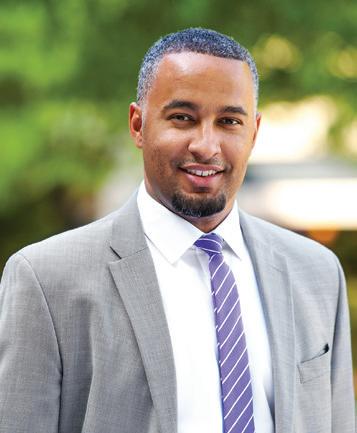
State Bar of New Mexico Committee on Diversity in the Legal Profession
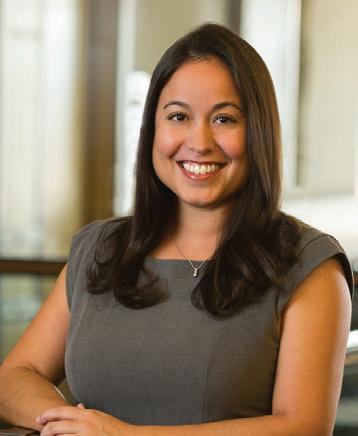
Advance Opinions
From the New Mexico Supreme Court and Court of Appeals
From the New Mexico Court of Appeals
Opinion Number: 2022-NMCA-028 Nos: A-1-CA-38910 & A-1-CA-38983 (consolidated for the purpose of opinion) (filed October 22, 2021)
STATE OF NEW MEXICO ex rel. CHILDREN, YOUTH & FAMILIES DEPARTMENT, Petitioner-Appellee, v. DOUGLAS B., Respondent-Appellant, and SARA E., Respondent,
IN THE MATTER OF ABIGAIL B., Child. and
STATE OF NEW MEXICO ex rel. CHILDREN, YOUTH & FAMILIES DEPARTMENT, Petitioner-Appellee, v. SARA E., Respondent-Appellant, and DOUGLAS B., Respondent,
IN THE MATTER OF ABIGAIL B., Child.
APPEAL FROM THE DISTRICT COURT OF VALENCIA COUNTY Allen R. Smith, District Judge
Certiorari Granted, April 19, 2022, No. S-1-SC-39139; Cross-Petition by CYFD Granted, April 19, 2022, No. S-1-SC-39139; Cross-Petition by Sara E. Granted, April 19, 2022, No. S-1-SC-39139. Released for Publication June 21, 2022.
Children, Youth & Families Department
Mary McQueeney, Acting Chief Children’s Court Attorney Robert Retherford, Children’s Court Attorney Santa Fe, NM for
Appellee
Law Offices of Nancy L. Simmons, P.C. Nancy L. Simmons Albuquerque, NM
for Appellant Douglas B.
Susan C. Baker El Prado, NM
for Appellant Sara E. Gail Chasey Albuquerque, NM
Guardian Ad Litem
http://www.nmcompcomm.us/
OPINION
MEDINA, Judge.
{1} This consolidated opinion addresses two separate appeals: State ex rel. Children, Youth & Families Department v. Douglas B. and State ex rel. Children, Youth & Families Department v. Sara E. Because the appeals stem from the same nexus of facts and raise substantially similar issues involving child abuse and neglect proceedings and the Indian Child Welfare Act (ICWA), 25 U.S.C. §§ 1901 to -1963 (1978, as amended through 2021), we exercise our discretion to consolidate them for decision. See Rule 12-317(B) NMRA.
{2} Douglas B. (Father) and Sara E. (Mother) (collectively, Parents) appeal the district court’s finding that Abigail B. (Child) is an abused and neglected child and the district court’s placement of Child in the custody of the Children, Youth and Families Department (CYFD). Parents raise three arguments on appeal. They contend that (1) CYFD did not prove that active efforts were made to preserve the family by clear and convincing evidence; (2) CYFD’s proffered qualified expert witness was not qualified; and (3) the expert did not offer the testimony required by ICWA to allow for Child’s removal from Parents’ custody. Because we agree that the proffered expert was not qualified to testify as to whether Child’s continued custody by Parents is likely to result in serious emotional or physical damage to Child, we reverse and remand for a new adjudicatory hearing consistent with this opinion.
BACKGROUND
{3} On October 16, 2018, CYFD received a referral from a source alleging that Child was abused and neglected by Parents. Child told the source that “she is cutting herself off and on[,] . . . [that] she [was] very depressed . . . [and that] she was going to run away and wanted to kill herself.” Child stated that Mother and Father “are constantly fighting with each other” and that “[Father] is an alcoholic.” According to Child, these fights “happen[] all of the time” and have, on more than one occasion, involved Parents throwing objects at one another, including wine glasses and a laptop computer.
{4} CYFD developed a safety plan to enable Child to stay in Parents’ home. However, several of Child’s family members expressed concern about “severe domestic violence occurring in the home[.]” Family members also told CYFD that Parents were using methamphetamine and abusing alcohol.
Bar Bulletin - December 28, 2022 - Volume 61, No. 24 19
Advance Opinions
“[B]ecause of the safety risks created by the ongoing domestic violence in the home and the concerns of drug use and inadequate shelter,” CYFD took custody of Child. Child was temporarily placed with Father’s sister, Kimberly B. (Aunt).
{5} On October 23, 2018, CYFD filed a petition alleging that Child was abused and neglected by Parents. At the time of its petition, CYFD did not know that Child was an Indian child for purposes of ICWA because Parents “refused to provide information concerning [Child]’s ancestry.” During an October 31, 2018 hearing, counsel for CYFD informed the court that because she was only notified of Child’s Native American heritage two days before the hearing, an ICWA notice had not yet been mailed to the tribe in which Child might be eligible for membership, the Wichita and Affiliated Tribe of Oklahoma (the Tribe). CYFD sent the Tribe notice of Child’s possible tribal affiliation, the Tribe informed CYFD that Child was eligible for membership, and the Tribe intervened in Child’s case.
{6} Over the course of several hearings, the district court heard testimony from a number of witnesses regarding the allegations of abuse. Aunt—Father’s sister and Child’s temporary foster parent—testified that she had concerns about Child’s safety given the frequent domestic violence in Parents’ home. Aunt testified that Father was not sober and that Father had recently told her that he had been using methamphetamine “for a very long time.” Aunt also testified that Parents’ home was cluttered, that Child’s window had been broken and boarded up, and that she was worried about Child’s safety in the event of a fire in the home.
{7} Child testified that she did not want to go home because of the fighting between Parents that occurred “once every other day or it would go on all night long.” On one occasion, Father broke Child’s bedroom door in order to reach Mother who was inside Child’s bedroom; as Father came through Child’s bedroom door, Mother grabbed Child’s laptop and “smashed it over [Father’s] head.” When asked to describe her mental health, Child replied that she feels “empty,” as if she were “in [a] dark hole that never ends.” Child acknowledged that she had been cutting her wrists.
{8} CYFD permanency planning supervisor Michelle Herrera testified about CYFD’s efforts to provide services to the family. Prior to the adjudicatory hearings, Herrera convened a meeting with Parents and their attorneys to discuss CYFD’s expectations and processes, including visitation with Child. Although such meetings are not typically arranged, Herrera deemed the meeting necessary as it had become
difficult to converse with Parents who frequently engaged in “yelling . . . threats, and arguing.” Herrera testified that CYFD attempted to provide (1) psychosocial assessments for Parents to further determine their strengths and opportunities for growth with respect to parenting Child; (2) psychological evaluations; (3) visitation with Child; (4) random drug testing for Parents; (5) substance abuse assessments; (6) mental health assessments for Parents; and (7) domestic violence assessments for Parents. Parents refused to participate in CYFD’s recommended services, insisting that they would only participate in services if they were court-ordered. However, when the district court adopted the proposed treatment plan, Parents objected and specifically took issue with the drug testing requirements.
{9} Herrera also testified about efforts to communicate with Parents and accommodate visitation. CYFD attempted to schedule visitation on weekdays, but this conflicted with Parents’ schedules, so CYFD sought volunteers to accommodate weekend visits for Parents. Parents did not show up for the first scheduled visit and missed the second scheduled visit. Due to Parents’ failure to appear, visitation with Child was suspended but resumed six months later upon Mother’s request. Parents instructed CYFD to contact them only through their attorneys, so CYFD sent monthly letters and regular emails to Parents’ attorneys to provide Parents with information regarding Child, including her academic progress and copies of case plans. Herrera explained that these communications also included offers to schedule service appointments for Parents and encouraged them to reach out to CYFD if they had any questions or concerns.
{10} The district court also heard from Kyli Ahtone, an ICWA caseworker employed by Child’s Tribe. She testified that she was a member of the Apache Tribe of Oklahoma—a tribe closely related to Child’s Tribe. She was familiar with the Tribe’s social and cultural expectations with respect to family organization based on her own personal experience. Ahtone also testified that she had significant experience working ICWA cases, had access to tribal members with whom she could consult for additional knowledge when necessary, had attended numerous trainings on ICWA, and had testified as a qualified expert witness more times than she could remember. The district court accepted Ahtone as a qualified “ICWA expert” witness. Ahtone ultimately opined that CYFD made active efforts to provide remedial services and rehabilitative programs intended to prevent the breakup of the Indian family and that “continued custody by . . . Parents would likely result in serious emotional or physical harm for . . . Child.”
{11} The district court adjudicated Child as abused and neglected and ordered that Child remain in CYFD custody under the care of Aunt. Father and Mother separately appeal, and we consolidate their appeals for decision.
DISCUSSION
I. Qualified Expert Witness Under ICWA
{12} The Abuse and Neglect Act (ANA), NMSA 1978, §§ 32A-4-1 to -35 (1993, as amended through 2021), our statutory framework for addressing child abuse and neglect in New Mexico, “represents a continuum of proceedings which begins with the filing of a petition for neglect or abuse and culminates in the termination of parental rights.” State ex rel. Child., Youth & Fams. Dep’t v. Maria C., 2004-NMCA-083, ¶ 25, 136 N.M. 53, 94 P.3d 796. Between these two fixed points lies the adjudicatory hearing, during which the court determines whether a child has, as CYFD alleges, been abused and neglected. See State ex rel. Child., Youth & Fams. Dep’t v. Melvin C., 2015-NMCA-067, ¶¶ 11-15, 350 P.3d 1251 (describing abuse and neglect proceedings under the ANA). Parents argue that CYFD failed to present a qualified expert witness during the adjudicatory hearing and that the district court committed reversible error by allowing Ahtone, CYFD’s proffered “ICWA expert[,]” to testify without the necessary foundation. We agree.
{13} Before addressing the parties’ arguments on the merits, we begin by clarifying the provisions of ICWA relevant to this issue and the applicable standard of review.
A. ICWA Sets Forth Two Distinct Requirements Applicable to Qualified Expert Witnesses
{14} Congress enacted ICWA “to protect the best interests of Indian children and to promote the stability and security of Indian tribes and families by the establishment of minimum Federal standards for the removal of Indian children from their families[.]” 25 U.S.C. § 1902. Relevant to the proceedings in this case, ICWA mandates that “[n]o foster care placement may be ordered . . . in the absence of a determination, supported by clear and convincing evidence, including testimony of qualified expert witnesses, that the continued custody of the child by the parent or Indian custodian is likely to result in serious emotional or physical damage to the child.” 25 U.S.C. § 1912(e) (emphasis added); State ex rel. Child., Youth & Fams. Dep’t v. Marlene C., 2011-NMSC-005, ¶ 30, 149 N.M. 315, 248 P.3d 863 (holding that § 1912(e), as well as § 1912(d), findings “must be made at the adjudicatory hearing because the adjudicatory hearing is the procedural phase that affords the Indian parent and tribe the most procedural due process protection and best accommodates the requirements of § 1912”).
20 Bar Bulletin
- December 28, 2022 - Volume 61, No. 24 http://www.nmcompcomm.us/
Advance Opinions
An understanding of ICWA’s qualified expert witness requirement is essential to effectuating ICWA’s statutory purpose. “Our overarching goal when interpreting ICWA is to effectuate Congress’s intent.” Marlene C., 2011-NMSC-005, ¶ 15.
{15} In discerning legislative intent, “we look first to the plain language of the statute, giving the words their ordinary meaning[.]” Flores v. Herrera, 2016-NMSC-033, ¶ 8, 384 P.3d 1070 (internal quotation marks and citation omitted). “[W]hen a statute contains language which is clear and unambiguous, we must give effect to that language and refrain from further statutory interpretation.” Truong v. Allstate Ins. Co., 2010-NMSC-009, ¶ 37, 147 N.M. 583, 227 P.3d 73 (internal quotation marks and citation omitted). Our review here is de novo. See State ex rel. Child., Youth & Fams. Dep’t v. Maisie Y., 2021-NMCA-023, ¶ 17, 489 P.3d 964.
{16} Because the phrase “qualified expert witness” is not defined by ICWA, we look to the federal regulations implementing ICWA and are further informed by the Bureau of Indian Affairs (BIA) interpretive guidelines. Cf. Marlene C. , 2011NMSC-005, ¶ 18 (considering federally promulgated guidelines when interpreting ambiguities in ICWA). Our Supreme Court has noted, “[I]t is hornbook law that an interpretation of a statute by the agency charged with its administration is to be given substantial weight, and is entitled to judicial deference[.]” Regents of Univ. of N.M. v. Hughes, 1992-NMSC-049, ¶ 30, 114 N.M. 304, 838 P.2d 458 (citation omitted) (examining a regulation when interpreting an act and providing that a regulation, which interprets a provision of an act and is promulgated pursuant to statutory authority, “is presumed to be a proper implementation of the provisions of the [a]ct”). In this case, recent regulations promulgated by the United States Department of the Interior, BIA—the executive agency tasked with promulgating rules and regulations to carry out ICWA’s provisions—aid our inquiry. See 25 U.S.C. § 1952 (requiring and authorizing the Secretary to “promulgate such rules and regulations as may be necessary to carry out the provisions of [this chapter of the ICWA]”).
{17} These regulations state that a “qualified expert witness must be qualified to testify regarding whether the child’s continued custody by the parent . . . is likely to result in serious emotional or physical damage to the child and should be qualified to testify as to the prevailing social and cultural standards of the Indian child’s Tribe.” 25 C.F.R. § 23.122(a) (2016) (emphases added).
The definition promulgated by the BIA thus splits the ICWA expert requirement into two separate components: serious damage and cultural standards. The use of the word “must” in the first portion of the definition imposes a mandatory requirement, while the use of the word “should” in the second portion of the definition does not. See Marbob Energy Corp. v. N.M. Oil Conservation Comm’n, 2009-NMSC013, ¶ 22, 146 N.M. 24, 206 P.3d 135 (“It is widely accepted that when construing statutes, ‘shall’ indicates that the provision is mandatory[.]”); In re N.R., 836 S.E.2d 799, 812 (W. Va. 2019), (observing that “[t]he [phrase] ‘should be’ suggests that state courts have discretion to determine whether such testimony is required given the particular circumstances of the case”), cert. denied sub nom. Rios v. W. Va. Dep’t of Health & Hum. Res., 140 S. Ct. 1550 (2020).
{18} Indeed, the BIA clarified that state courts have discretion to determine whether cultural standard testimony is “necessary in any particular case.” See Indian Child Welfare Act Proceedings, Final Rule, 81 Fed. Reg. 38,778, 38830 (June 14, 2016).1 In issuing the 2016 Regulations, the BIA explained: The final rule does not . . . strictly limit who may serve as a qualified expert witness to only those individuals who have particular Tribal social and cultural knowledge. The Department recognizes that there may be certain circumstances where a qualified expert witness need not have specific knowledge of the prevailing social and cultural standards of the Indian child’s Tribe in order to meet the statutory standard. For example, a leading expert on issues regarding sexual abuse of children may not need to know about specific Tribal social and cultural standards in order to testify as a qualified expert witness regarding whether return of a child to a parent who has a history of sexually abusing the child is likely to result in serious emotional or physical damage to the child. Thus, while a qualified expert witness should normally be required to have knowledge of Tribal social and cultural standards, that may not be necessary if such knowledge is plainly irrelevant to the particular circumstances at issue in the proceeding.
1 The “Final Rule” refers to the 2016 amendments to ICWA. 81 Fed. Reg. 38,778, 38,779.
Id. at 38,829-30 (citation omitted). In accordance with this guidance, we conclude, as have other states, that a qualified expert witness for ICWA purposes must be qualified to testify regarding serious damage, but need not necessarily be qualified to testify about cultural standards if such expertise is irrelevant to the particular circumstances at issue in the proceeding. See, e.g., Eva H. v. Dep’t of Health & Soc. Servs., 436 P.3d 1050, 1054 (Alaska 2019) (“[T]he ability to testify about the risk of harm is required of every qualified expert witness, but the ability to testify about ‘the prevailing social and cultural standards’ is not essential in every case.”); Steven H. v. Ariz. Dep’t of Econ. Sec., 190 P.3d 180, 185 (Ariz. 2008) (concluding that ICWA always requires that an expert be able to testify about harm to the child, but not about tribal customs and childrearing practices); In re R.L., 961 P.2d 606, 609 (Colo. App. 1998) (“[I]f termination is based on parental unfitness unrelated to Indian culture or society, an expert witness . . . need not possess special knowledge of Indian life.”); In re Guardianship of LNP, 294 P.3d 904, 910-11 (Wyo. 2013) (concluding that a qualified expert witness with substantial education and experience need not have special knowledge of Indian life if testimony does not implicate cultural bias); In re L.L., 2019 UT App. 134, ¶ 19, 454 P.3d 51 (recognizing that “[i]n many ICWA cases, expert testimony may be necessary to educate a court about tribal customs and childrearing practices to diminish any risk of cultural bias” (emphasis added) (internal quotation marks and citation omitted)).
B. The Standard of Review Applicable to a District Court’s Acceptance of Qualified Expert Witnesses Under ICWA Is Abuse of Discretion {19} Before we address whether the district court erred in accepting Ahtone as a qualified expert witness, we must first determine the standard of review applicable to this inquiry. Parents argue that our consideration of the qualifications of proffered expert witnesses should be de novo. In contrast, CYFD argues that an abuse of discretion standard should be adopted. {20} The standard of review to be applied to a district court’s decision to qualify and admit the testimony of a qualified expert witnesses within the meaning of 25 U.S.C. § 1912(f) appears to be a matter of first impression in New Mexico. Father directs us to In re L.L., 454 P.3d 51, to support his argument that the admission of an individual as a qualified expert witness under ICWA should be reviewed under a de novo standard.
Bar Bulletin - December 28, 2022 - Volume 61, No. 24 21 http://www.nmcompcomm.us/
Advance Opinions
In In re L.L., the Utah Court of Appeals reviewed an appeal by a guardian ad litem challenging the district court’s denial of its motion to transfer the custody of an Indian child from her mother to the state’s family services department. Id. ¶ 1. On appeal, the guardian ad litem argued that the district court erred when it deferred to the interpretation of the qualified expert witness requirement in the regulations and in doing so, precluded the guardian ad litem’s proffered witnesses from being admitted as qualified expert witnesses. Id. ¶¶ 5, 7. Contrary to Father’s characterization however, the Utah Court of Appeals did not review the district court’s rejection of the guardian ad litem’s proffered expert witnesses under a de novo standard. Rather, the court reviewed de novo the district court’s interpretation of and deference to the qualified expert witness definition included in BIA regulations Id. ¶ 8. Upon concluding that no error occurred in this respect, the court then determined that the district court’s application of the qualified expert witness definition to the facts at hand was in excess of its discretion. Id. ¶¶ 8, 20-23. Father’s reliance on In re L.L. is thus misplaced.
{21} Similarly, Mother argues for de novo review of the admission of a qualified expert witness, citing Marcia V. v. Alaska, 201 P.3d 496 (Alaska 2009), but her argument misconstrues the case. In Marcia V. , the Alaska Supreme Court noted that “[t]he question of whether an expert’s testimony presented at trial is sufficient pursuant to ICWA is a legal question, which we review de novo.” Id. at 502. However, the court did not—as Mother seems to claim—review the admission of the qualified expert witnesses de novo, but instead applied an abuse of discretion standard to that question. See id. at 505 (“[W]e conclude that the court did not abuse its discretion in qualifying [a state children’s services supervisor] as an expert[.]”).
{22} Unpersuaded by Parents’ arguments, we turn again to the same 2016 regulations for a different purpose: to determine whether they offer any guidance as to the applicable standard. The 2016 regulations explain that [a ] qualified expert witness must be qualified to testify regarding whether the child’s continued custody by the parent . . . is likely to result in serious emotional or physical damage to the child and should be qualified to testify as to the prevailing social and cultural standards of the Indian child’s Tribe.
A person may be designated by the Indian child’s Tribe as being qualified to testify to the prevailing social and cultural standards of the Indian child’s Tribe.
25 C.F.R. § 23.122(a) (emphases added). The requirement that an expert be “qualified” implies that ICWA experts are to be evaluated in the same manner as other experts under a given jurisdiction’s evidentiary rules. See, e.g., Rule 11-702 NMRA (“A witness who is qualified as an expert by knowledge, skill, experience, training or education may testify in the form of an opinion or otherwise if the expert’s scientific, technical, or other specialized knowledge will help the trier of fact to understand the evidence or to determine a fact in issue.”); see also State v. Alberico, 1993-NMSC-047, ¶ 43, 116 N.M. 156, 861 P.2d 192 (noting that the first prerequisite for admission of expert testimony “is that the expert be qualified”).
{23} We see no reason to apply a different appellate review framework from the abuse of discretion standard that we generally apply in New Mexico to evaluate the admission of expert testimony. See Id. ¶ 58 (“The rule in this [s]tate has consistently been that the admission of expert testimony . . . is peculiarly within the sound discretion of the trial court and will not be reversed absent a showing of abuse of that discretion.”). We have routinely applied the abuse of discretion standard when evaluating whether an individual is qualified to testify as an expert witness across all other contexts where the admission of expert witness testimony is at issue. Id.; see also State v. Sloan, 2019-NMSC019, ¶ 42, 453 P.3d 401 (“Appellate courts review the qualification of an expert for an abuse of discretion.”); Lopez v. Reddy, 2005-NMCA-054, ¶ 14, 137 N.M. 554, 113 P.3d 377 (“In determining whether an expert witness is competent or qualified to testify, the district court has wide discretion, and the court’s determination of this question will not be disturbed on appeal, unless there has been an abuse of this discretion.” (alteration, omission, internal quotation marks, and citation omitted)). Not only is this conclusion supported by our own jurisprudence, it is also supported by decisions from other jurisdictions addressing this issue in the context of ICWA, including those cases cited by Parents. See, e.g., In re L.L., 2019 UT App. 134, ¶ 8 (applying abuse of discretion to admission of expert witness in a case subject to ICWA); Marcia V., 201 P.3d at 501 (same); Monroe Cnty. Dep’t of Hum. Servs. v. Luis R., 2009 WI App 109, ¶ 33,
320 Wis. 2d 652, 770 N.W.2d 795 (same); In re LNP, 2013 WY 20, ¶ 17, 294 P.3d 904 (same); In re D.M., 2003 SD 49, ¶ 19, 661 N.W.2d 768, 773 (same); In re T.W.F., 2009 MT 207, ¶ 17, 351 Mont. 233, 210 P.3d 174 (same); Busenbark v. Oklahoma, 2005 OK CIV APP 5, ¶ 17, 105 P.3d 354, 359 (same). We note that to the extent our analysis of this issue involves the interpretation of ICWA and other questions of law, our review is de novo. See Maisie Y., 2021-NMCA-023, ¶ 17.
C.
Whether Ahtone Was Qualified to Testify as the Qualified Expert Witness
{24} Having determined the appropriate standard of review, we now evaluate whether the district court abused its discretion in allowing Ahtone to testify as the ICWA qualified expert witness in this case. “In determining whether an expert witness is competent or qualified to testify, the [district] court has wide discretion, and the court’s determination of this question will not be disturbed on appeal, unless there has been an abuse of this discretion.” Lopez, 2005-NMCA-054, ¶ 14 (alteration, omission, internal quotation marks, and citation omitted). “The ruling will not be disturbed unless it is manifestly wrong or the trial court has applied wrong legal standards in the determination.” Id. (alterations, omission, internal quotation marks, and citation omitted).
{25} We reiterate that ICWA’s qualified expert witness requirement has two components: (1) a “qualified expert witness must be qualified to testify regarding whether the child’s continued custody by the parent . . . is likely to result in serious emotional or physical damage to the child,” and (2) the witness “should be qualified to testify as to the prevailing social and cultural standards of the Indian child’s Tribe.” 25 C.F.R. § 23.122(a) (emphases added). We address the cultural standards requirement first because both the parties and the district court focused primarily on this requirement during proceedings below.
1.
Ahtone Was Qualified to Testify With Respect to the Prevailing Social and Cultural Standards of
Child’s Tribe2
{26} In his reply brief, Father argues that the recommendation or designation of a qualified expert witness by a tribe or the BIA should not be entitled to deference. This, however, is contrary to the BIA guidelines, which provide that “[a] qualified expert witness should have specific knowledge of the Indian tribe’s culture and customs[,]” and then sets out a list of persons who, “in descending order [based on various levels of experience and knowledge],
2 Neither party addresses whether an expert in prevailing social and cultural standards of Child’s Tribe was necessary under the circumstances of this case. We, therefore, do not address this matter.
- December 28, 2022 - Volume 61, No. 24
22 Bar Bulletin
http://www.nmcompcomm.us/
Advance Opinions
are presumed to meet the requirements for a qualified expert witness[,]” including “[a] member of another tribe who is recognized to be a qualified expert witness by the Indian child’s tribe based on their knowledge of the delivery of child and family services to Indians and the Indian child’s tribe.” Guidelines for State Courts & Agencies in Indian Child Custody Proceedings, 80 Fed. Reg. 10,146, 10,157, § D.4 (Feb. 25, 2015).3
{27} Regardless, Ahtone demonstrated that she was in fact qualified to testify as to the prevailing social and cultural standards of the Child’s Tribe by testifying to her experience and knowledge. See Rule 11-702 (“A witness who is qualified as an expert by knowledge, skill, experience, training or education may testify in the form of an opinion or otherwise if the expert’s scientific, technical or other specialized knowledge will help the trier of fact understand the evidence or to determine a fact in issue.”); see also 171 Am. Jur. 3d Proof of Facts 293, § 39 (2018) (“In child custody proceedings subject to the ICWA, the trial court is required to determine the proper foundation to qualify a witness as an expert witness.”). She testified that she was a member of the Apache Tribe of Oklahoma—a tribe closely related to the Tribe. Ahtone grew up on her tribe’s reservation and was also raising her own children in her cultural traditions. She was familiar with the Tribe’s social and cultural expectations with respect to family organization based on her own personal experience, and also had access to tribal members with whom she could consult for additional knowledge when necessary. Ahtone also testified that she had significant experience working ICWA cases, had attended numerous trainings on ICWA, and had testified as a qualified expert witness more times than she could remember.
{28} Despite Ahtone’s apparent qualifications, Father argues that Ahtone could not serve as a qualified expert witness because she is not a member of Child’s Tribe. We disagree. BIA guidelines explicitly state that “[t]here is no requirement that the qualified expert witness be a citizen of the child’s Tribe.” U.S. Dep’t of the Interior, Bureau of Indian Affairs, Guidelines for Implementing the Indian Child Welfare Act, 55 (2016). Taking this one step further, the guidelines explain that “[i]n some instances, it may be appropriate to accept an expert with knowledge of the customs and standards of closely related Tribes.” Id.
{29} Such is the case here. Ahtone, a member of the Apache Tribe of Oklahoma, testified at the adjudicatory hearing that she was familiar with the cultural and social standards of the Tribe and that she was unaware of any significant different tribal standards between her tribe and Child’s. Through her
employment with the Tribe, Ahtone had attended more ceremonies with the Tribe than with her own tribe. Moreover, Ahtone explained that she had access to members of the Tribe with whom she could consult when she has specific questions about the Tribe’s cultural and social standards. Given the foregoing, we conclude that the district court did not abuse its discretion in accepting her testimony as to the applicable prevailing social and cultural standards.
2. Ahtone Was Not Qualified to Opine as to Whether Child’s Continued Custody by Parents Was Likely to Result in Serious Emotional or Physical Damage to Child
{30} We now consider whether Ahtone was “qualified to testify regarding whether the child’s continued custody by the parent . . . is likely to result in serious emotional or physical damage to the child.” 25 C.F.R. § 23.122(a). Based upon the record before us, we conclude that CYFD did not lay a sufficient foundation to establish that Ahtone had the requisite “knowledge, skill, experience, training or education,” see Rule 11-702, to form an opinion on this subject. {31} Subsections (c) and (d) of 25 C.F.R. § 23.121 (2016) illuminate the evidentiary standard a proffered ICWA expert testifying about potential emotional or physical damage to the child must meet:
(c) For a foster-care placement or termination of parental rights, the evidence must show a causal relationship between the particular conditions in the home and the likelihood that continued custody of the child will result in serious emotional or physical damage to the child[.]
(d) Without a causal relationship identified in paragraph (c) . . . evidence that shows only the existence of community or family poverty, isolation, single parenthood, custodian age, crowded or inadequate housing, substance abuse, or nonconforming social behavior does not by itself constitute clear and convincing evidence or evidence beyond a reasonable doubt that continued custody is likely to result in serious emotional or physical damage to the child.
BIA guidelines further explain that an expert witness who is qualified to draw this causal connection must have an “expertise beyond normal social worker qualifications.” U.S. Dep’t of the Interior, BIA, Guidelines for Implementing the Indian Child Welfare Act, 53-54. We join
http://www.nmcompcomm.us/
the numerous courts in other jurisdictions that have interpreted this language as requiring ICWA experts to have expertise beyond the “normal” social worker qualifications. See Luis R., 2009 WI App 109, ¶ 38 (holding that social worker’s specialized knowledge as result of bachelor’s and master’s degrees in criminal justice did not qualify the social worker to testify regarding the likelihood of serious damage to the child from continued custody by the parent, and experience in monitoring conditions imposed on parents for the return of their children did not suggest something beyond normal social work qualifications); Eva H., 436 P.3d at 1056 (holding that the proposed expert witness’s extensive experience as a guardian ad litem did not meet the heightened standard for qualified expert witnesses under ICWA); In re M.F., 225 P.3d 1177, 1185 (Kan. 2010) (holding that social workers testifying in a proceeding subject to ICWA must have substantial education and experience in the area of social work beyond the typical qualifications for the profession and citing other jurisdictions that have reached the same conclusion); C.E.H. v. L.M.W., 837 S.W.2d 947, 955 (Mo. Ct. App. 1992) (stating that the phrase “qualified expert witness” is not defined by ICWA, but legislative history of ICWA reveals that phrase is meant to apply to expertise beyond normal social worker’s qualifications).
{32} Father argues that there was “no indication whether Ahtone’s training and experience equipped her to address ‘serious emotional or physical damage to [C]hild’ at any level.” We agree that the record does not contain a sufficient foundation establishing that Ahtone was qualified to render an expert opinion on this subject. Under Rule 11-702, “a witness must qualify as an expert in the field for which his or her testimony is offered before such testimony is admissible. In most cases, this means that the calling party must qualify the witness to testify as an expert first, before any substantive testimony is given.” Lopez, 2005-NMCA054, ¶ 15 (internal quotation marks and citations omitted). This case involved allegations of substance abuse, domestic violence, self-harm, suicidal ideation, and household hazards, and Ahtone did not demonstrate that she had the requisite expertise in these areas to opine as to “a causal relationship between [these] particular conditions . . . and the likelihood that continued custody of [C] hild will result in serious emotional or physical damage to [Child].” 25 C.F.R. § 23.121(c).
3 While we acknowledge that only the regulations and not the guidelines are binding, “[w]e have previously found [BIA] guidelines persuasive[.]” In re Guardianship of Ashley Elizabeth R., 1993-NMCA-129, ¶ 8, 116 N.M. 416, 863 P.2d 451.
24 23
Bar Bulletin - December 28, 2022 - Volume 61, No.
Advance Opinions
{33} Ahtone did testify that she holds a bachelor’s degree in criminal justice, significant experience working ICWA cases over her five-year tenure as an ICWA caseworker, had attended numerous trainings on ICWA, and had been qualified as an ICWA expert witness at least fifty times. She also said she was familiar with how tribal family disputes are generally resolved based on personal experience growing up in a similar tribal culture. Finally, she testified that alcohol and drug abuse is not typically tolerated within tribal cultures. However, Ahtone did not claim to have any education, training, or specialized knowledge that would permit her to testify about “a causal relationship between the particular conditions in the home and the likelihood that continued custody of [C]hild will result in serious emotional or physical damage to [Child.]” 25 C.F.R. § 23.121(c). Numerous other courts have concluded that proffered experts with similar levels of training and experience do not meet ICWA’s heightened requirement for expert testimony. See, e.g., Eva H., 436 P.3d at 1057 (holding that a guardian ad litem experienced in cases involving substance abuse, domestic violence, and delivery of child to protective services did not meet the heightened standard for a qualified expert witnesses under ICWA because the proffered expert had no formal training in social work, psychology, or counseling, and she had no professional tools for recognizing mental health issues); Oliver N. v. Dep’t of Health & Soc. Servs., 444 P.3d 171, 177-79 (Alaska 2019) (holding that a tribal elder offered as an expert at a termination of parental rights trial, while clearly qualified to testify to tribal cultural standards and childrearing norms, was unqualified to speak to the likelihood of harm to the child if returned to the parent’s custody because there was no evidence that the source of the tribal elder’s conclusion that the father’s behavior would likely harm the child was based on anything other than the elder’s extensive life experience as a community leader and grandfather, which was insufficient to qualify him to testify about the likelihood of harm should the child be returned to the father); Luis R., 2009 WI App 109, ¶ 38 (holding that a social worker’s specialized knowledge as a result of bachelor’s and master’s degrees in criminal justice did not relate to required showing of likely serious damage to the child from continued custody by the parent, and experience in monitoring conditions imposed on the
⁴
parents for the return of their children did not suggest something beyond normal social work qualifications); In re Adoption of H.M.O., 1998 MT 175, ¶ 34, 289 Mont. 509, 962 P.2d 1191 (holding that the district court abused its discretion in qualifying an ICWA expert where the record was silent as to the qualifications beyond being a social worker). {34} Similarly here, we are not satisfied that CYFD laid a sufficient foundation to qualify Ahtone as an expert witness qualified to opine as to the likelihood of future emotional or physical damage to Child. We acknowledge that “no set criteria can be laid down to test [the] qualifications” of an expert, Smith v. Smith, 1992-NMCA-080, ¶ 19, 114 N.M. 276, 837 P.2d 869, and we do not mean to say that a social worker may never be qualified as an expert witness for ICWA purposes.⁴ Nonetheless, we do not believe that Ahtone adequately demonstrated that she had the requisite knowledge, education, or training, to qualify as an expert on this issue. She did not explain whether or how her bachelor’s degree in criminal justice supported her purported expertise, did not explain the specifics of her ICWA training, or indicate whether or how her ICWA training provided her with relevant knowledge, and when asked about family disputes and substance abuse, testified that her understanding of such matters was limited to her personal experiences growing up.
{35} Under an abuse of discretion standard, a district court’s qualification of an expert “will not be disturbed, unless it is manifestly wrong or the [district] court has applied wrong legal standards in the determination.” Lopez , 2005-NMCA054, ¶ 14 (alterations, omission, internal quotation marks, and citation omitted). In this case, the district court did not appear to draw a distinction between Ahtone’s qualifications to opine on social and cultural standards and the separate requirement that she be qualified to opine on emotional or physical damage to Child. Instead, the district court ultimately qualified her under the general term “ICWA expert.” In failing to separate these two bases, the district court applied the wrong legal standard, and there is insufficient foundational evidence in the record to uphold the district court’s acceptance of Ahtone as qualified to issue an opinion as to whether Child’s continued custody by Parents was likely to result in serious emotional or physical damage.
bleuslaw@gmail.com In absence of testimony from a qualified expert, we conclude that the district court’s finding required under § 1912(e) must be reversed as well as the neglect and abuse adjudications. See Marlene C., 2011-NMSC-005, ¶ 47 (reversing neglect adjudication “because the findings required by § 1912 (d) and (e) of ICWA were not made at the adjudicatory hearing on abuse and neglect”).⁵
II. The Remedy on Remand
{36} In his brief in chief, Father’s requests that we reverse and remand with instructions to implement a plan for reunification and in his reply brief requests that we reverse and remand for a new trial. Mother on the other hand seeks reversal of the adjudication order, return of Child to Mother, and alternatively a new custody and adjudicatory hearing “to ensure proof that Mother received ‘active efforts’ prior to the removal of Child” and at which CYFD presents testimony from a qualified ICWA expert. CYFD requests affirmance of the district court’s adjudicatory order in both Father and Mother’s cases.
{37} In this case as a matter of first impression we clarify that ICWA sets forth two distinct requirements for qualified expert witnesses, and we reverse the neglect and abuse adjudications upon a determination that the record did not support the district court’s qualification of Ahtone to testify as an expert regarding the risk of harm to Child. We recognize that if we were to order dismissal of the abuse and neglect petition, CYFD would be “precluded from bringing the same potentially meritorious allegations in a new petition but would instead have to decide whether it had grounds to supplement the original petition or file a new petition with different allegations of abuse or neglect.” Marlene C., 2011-NMSC-005, ¶ 49. We conclude, just as our Supreme Court concluded in Marlene C., that “requiring CYFD to begin the process anew in this case by bringing new allegations of abuse [and] neglect neither promotes judicial economy nor protects Child’s best interests.” Id. Therefore we remand this case to the district court for a new adjudicatory hearing.
CONCLUSION
{38} For the foregoing reasons, we reverse and remand for further proceedings in accordance with this opinion.
{39} IT IS SO ORDERED.
JACQUELINE R. MEDINA, Judge WE CONCUR: JENNIFER L. ATTREP, Judge MEGAN P. DUFFY, Judge
We recognize “[t]he social worker regularly assigned to the Indian child may not serve as a qualified expert witness in childcustody proceedings.” 25 C.F.R. § 23.122(c).
⁵
Because we conclude that the district court abused its discretion in qualifying Ahtone as an expert capable of offering a risk of harm opinion and reverse on that ground, we need not address Parents’ separate challenge to the sufficiency of her testimony, nor do we reach Parents’ remaining arguments on appeal.
24 Bar Bulletin
- December 28, 2022 - Volume 61, No. 24 http://www.nmcompcomm.us/
Welcomes New Associates
Jacques Chouinard

Mr. Chouinard joins the Business Department working with the Real Estate practice group.
Alejandro Rettig y Martinez
Mr. Rettig y Martinez joins the Litigation Department, working primarily with the Complex & Commercial Litigation Group.
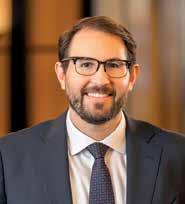
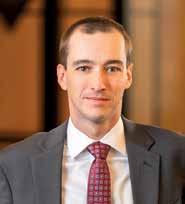
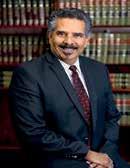
Please join us in welcoming our newest associates to the Rodey Law Firm.


Bar Bulletin - December 28, 2022 - Volume 61, No. 24 25
www.sbnm.org TWEET LIKE Share Comment Connect Follow State Bar of New Mexico Est. 1886
























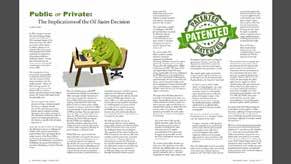





26 Bar Bulletin - December 28, 2022 - Volume 61, No. 24 Personal injury lawyers with an aggressive, complex trial approach Accepting Referrals and Co-Counseling Relationships for Medical and Legal Malpractice Claims. DavisKelin.com 505.588.7319 JOHN R. BATTLE, CPA, CVA, MAFF, CM&AA Valuation and Consulting, LLC Economic Damages Consulting/Litigation Support Commercial Lost Profits • Employment Economic Damages Contractual Economic Damages • Complex Damage Claims Permanent Injury and Wrongful Death Economic Damages Experienced Expert Witness Services for Plaintiff and Defendant Business Valuations Estate, Trust and Gifting • Shareholder Disputes • Marital Dissolution Buying or Selling Business 706 Court Appointed Expert/Experienced Expert Witness Services PO Box 189, La Luz, NM 88337 575.488.3410 (Office) • 575.921.7578 (Cell) jbattlecpa@tularosa.net Read the Bar Bulletin online with • Beautiful layout • Keyword search • Get notification of new issues • Access from your mobile phone www.sbnm.com




Bar Bulletin - December 28, 2022 - Volume 61, No. 24 27 1540 Juan Tabo NE, Suite H, Albuquerque, NM 87112 bletherer@licnm.com • 505.433.4266 www.licnm.com Make sure your insurance policy has: • Prior acts coverage, to cover your past work. • Claim expenses outside the limit of liability, no PacMan. • “A” rating from A.M. Best, important, some companies are NOT! • Free tail options for retiring attorneys. I NSURANCE C ONSULTANTS, INC. P ROFESSIONAL L IABILITY S PECIALISTS Brian Letherer We help solve insurance problems for the growth of your firm We shop up to 22 professional liability insurance companies to find the right price and fit for your law firm.
THE TURNER LAW FIRM, LLC We are pleased to announce that Scott A. Beckman Has joined the Firm as an Associate. 500 4th St. NW, Suite 200 Albuquerque, New Mexico 87102 Telephone: 505-242-1300 • Fax: 505-242-1441 www.turnerlaw.us 505-629-3116 1650 Hospital Drive, Suite C Santa Fe, NM 87501 www.ellewell.com We provide full service chiropractic, acupuncture, medical, physical therapy, massage, rehabilitation and holistic services for patients injured in car accidents or personal injury cases. We have 20 years of experience in treating these cases with great success and patient satisfaction. We also have extensive experience in necessary medical billing, depositions and as expert witnesses. DIGITAL PRINT CENTER Featuring: Business cards, Stationary, Envelopes, Brochures, Booklets, Magazines, Programs, Calendars, Invitations, Postcards, Note cards and Holiday cards Binding (Square Back, Spiral, Saddle Stitch), Folding, Trimming, Punching, Scoring Where Quality and Customer Service Matters! We have turn-key service. Your job will have personal service from start to finish. Ask about your Member Discount! Marcia Ulibarri, Advertising and Sales Manager: 505-797-6058 or marcia.ulibarri@sbnm.org Digital Print Center
Mallory Letherer
SCHOOL OF LAW
FAMILY MEDIATION TRAINING
SPRING OFFERING
April 14 ‐ 16 & 21 ‐ 23, 2023
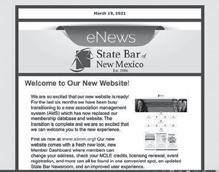
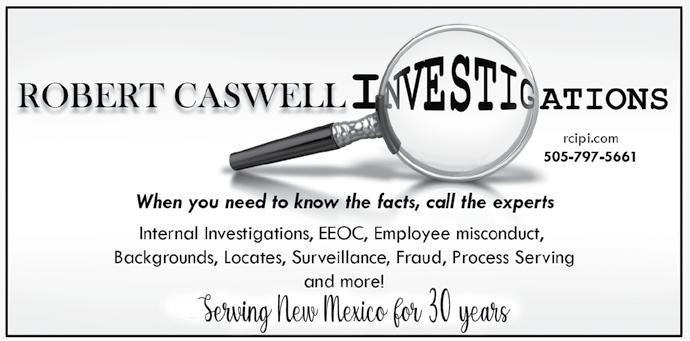
Attendance is mandatory for all classes, both weekends.

INSTRUCTORS
Laura Bassein & David Levin
FRIDAY SATURDAY SUNDAY
1:30pm to 6:30pm 8:30am to 6:30pm 8:30am to 2:30pm
28 Bar Bulletin - December 28, 2022 - Volume 61, No. 24
This is
“learning
David Stotts Attorney at Law Commercial Real Estate Loan Workouts, Lenders or Borrowers 242-1933 Caren I. Friedman Rosalind B. Bienvenu cfriedman@dpslawgroup.com | rbienvenu@dpslawgroup.com 505.986.0600 Appeals & Strategic Litigation Support Visit the State Bar of New Mexico’s website www.sbnm.org Get Your Business Noticed! Advertise in our email newsletter, delivered to your inbox every Friday. Contact Marcia Ulibarri, at 505-797-6058 or email marcia.ulibarri@sbnm.org Benefits: • Circulation of 8,000 • Affordable pricing • High open/click rates • Schedule flexibility • Popular content Winner of the 2016 NABE Luminary Award for Excellence in Electronic Media eNews State Bar of New Mexico Est. 1886
Community enrollment is limited to nine, so register now for this valuable opportunity to learn the skill and art of mediation! Classes held at UNM Law School 1117 Stanford Drive NE *UNM Tuition Remission is available for UNM faculty & staff* FOR MORE INFORMATION & ON-LINE REGISTRATION VISIT: http://lawschool.unm.edu/mediation/family/index.html Family Mediation is an intensive 40-hour course with a mandatory prerequisite of the completion of Mediation training. The focus of skills development will be on the mediation of parenting, support, and property issues in family court cases.
an intensive 2 weekend
by doing” course offered by the School of Law to members of the legal profession, community members, and current, upper class law students. Training tools include mediation simulations and debriefings, professional demonstrations, videotapes, small and large group discussions and guest speakers.
Classified
Positions
Various Assistant City Attorney Positions
The City of Albuquerque Legal Department is hiring for various Assistant City Attorney positions. The Legal Department’s team of attorneys provides a broad range of legal services to the City, as well as represent the City in legal proceedings before state, federal and administrative bodies. The legal services provided may include, but will not be limited to, legal research, drafting legal opinions, reviewing and drafting policies, ordinances, and executive/administrative instructions, reviewing and negotiating contracts, litigating matters, and providing general advice and counsel on day-to-day operations. Attention to detail and strong writing and interpersonal skills are essential. Preferences include: Five (5)+ years’ experience as licensed attorney; experience with government agencies, government compliance, real es-tate, contracts, and policy writing. Candidates must be an active member of the State Bar of New Mexico in good standing. Salary will be based upon experience. Current open positions include: Assistant City Attorney – EHD – Air Quality; Assistant City Attorney – Property & Finance. For more information or to apply please go to www.cabq.gov/jobs. Please include a resume and writing sample with your application.
Deputy District Attorney, Senior Trial Attorneys, Trial Attorneys, and Assistant Trial Attorneys
The Third Judicial District Attorney’s Office in Las Cruces is seeking a Deputy District Attorney, Senior Trial Attorneys, Trial Attorneys, and Assistant Trial Attorneys. You will enjoy the convenience of working in a metropolitan area while gaining valuable trial experience alongside experienced Attorney’s. Please see the full position descriptions on our website http://donaanacountyda.com/ Submit Cover Letter, Resume, and references to Whitney Safranek, Human Resources Administrator at wsafranek@da.state.nm.us
Various Attorney Positions
The New Mexico Office of Attorney General is recruiting various attorney positions. The NMOAG is committed to attracting and retaining the best and brightest in the workforce. NMOAG attorneys provide a broad range of legal services for the State of New Mexico. Interested applicants may find listed positions by copying the URL address to the State Personnel website listed below and filter the data to pull all positions for Office of Attorney General. https://www.spo.state.nm.us/view-job-opportunities-and-apply/applicationguide/
Commercial Liability Defense, Coverage Litigation Attorney P/T maybe F/T
Our well-established, regional, law practice seeks a contract or possibly full time attorney with considerable litigation experience, including familiarity with details of pleading, motion practice, and of course legal research and writing. We work in the are of insurance law, defense of tort claims, regulatory matters, and business and corporate support. A successful candidate will have excellent academics and five or more years of experience in these or highly similar areas of practice. Intimate familiarity with state and federal rule of civil procedure. Admission to the NM bar a must; admission to CO, UT, WY a plus. Apply with a resume, salary history, and five-page legal writing sample. Work may be part time 20+ hours per week moving to full time with firm benefits as case load develops. We are open to "of counsel" relationships with independent solo practitioners. We are open to attorneys working from our offices in Durango, CO, or in ABQ or SAF or nearby. Compensation for billable hours at hourly rate to be agreed, generally in the range of $45 - $65 per hour. Attorneys with significant seniority and experience may earn more. F/T accrues benefits. Apply with resume, 5-10p legal writing example to revans@evanslawfirm.com with "NM Attorney applicant" in the subject line.
Assistant District Attorney
The Fifth Judicial District Attorney’s office has immediate positions open for new and/ or experienced attorneys. Salary will be based upon the New Mexico District Attorney’s Salary Schedule with salary range of an Assistant Trial Attorney to a Senior Trial Attorney ($58,000 to $79,679). These positions are located in the Carlsbad and Roswell offices. Please send resume to Dianna Luce, District Attorney, 100 N Love Street, Suite 2, Lovington, NM 88260 or email to 5thDA@ da.state.nm.us
Personnel Hearing Officer
The City of Albuquerque is soliciting responses from qualified firms or attorneys interested in serving as contract Personnel Hearing Officer for personnel hearings under the City’s Merit System Ordinances, §3-1-1 et seq. ROA 1994 and the Independent Hearing Office Ordinance Section §2-7-2 ROA 1994. The hearing officers may also provide services for other miscellaneous hearings under assorted City Ordinances. The full Request for Proposals can be accessed at: https://cabq.bonfirehub.com/portal/?tab=openOpportunities
Proposals are due no later than January 4, 2023 @ 4:00pm Local Time.
Associate Attorney – Civil Litigation
Sutin, Thayer & Browne is seeking a full-time Civil Litigation Associate. The candidate must have at least 3 years of experience relevant to civil litigation, and must have excellent legal writing, research, and verbal communication skills. Competitive salary and full benefits package. Visit our website https://sutinfirm.com/ to view our practice areas. Send letter of interest, resume, and writing sample to sor@sutinfirm.com.
Entry Level and Experienced Trial Attorneys
The Thirteenth Judicial District Attorney’s Office is seeking both entry level and experienced trial attorneys. Positions available in Sandoval, Valencia, and Cibola Counties. Enjoy the convenience of working near a metropolitan area while gaining valuable trial experience in a smaller office, providing the opportunity to advance more quickly than is afforded in larger offices. The 13th Judicial District has family friendly policies. Salary is depending on experience. Ranging from $65,000- $92,000 Contact Krissy Fajardo @ kfajardo@da.state.nm.us or visit our website for an application @https://www.13th.nmdas. com/ Apply as soon as possible. These positions will fill up fast!
Attorney
Madison, Mroz, Steinman, Kenny & Olexy, P.A., an AV-rated civil litigation firm, seeks an attorney with 3+ years’ experience to join our practice. We offer a collegial environment with mentorship and opportunity to grow within the profession. Salary is competitive and commensurate with experience, along with excellent benefits. All inquiries are kept confidential. Please forward CVs to: Hiring Director, P.O. Box 25467, Albuquerque, NM 87125-5467.
Attorney (7+ years)
Well established (17+ years) civil defense firm is seeking an experienced attorney with 7+ years litigation with prospects of becoming a shareholder. We are flexible, team oriented and committed to doing excellent work for our clients. We have long standing clients and handle interesting matters, including in the areas of labor/employment, construction, personal injury, medical malpractice, commercial litigation, civil rights, professional liability, insurance defense, and insurance coverage. We are looking for a team player with a solid work record and a strong work ethic. Excellent pay and benefits and opportunities for bonuses. All replies will be kept confidential. Interested individuals should e-mail a letter of interest and resumes to Conklin, Woodcock & Ziegler, P.C. at: jobs@ conklinfirm.com.
Bar Bulletin
December
- Volume 61, No. 24 29
-
28, 2022
The Office of the Second Judicial District Attorney
The Office of the Second Judicial District Attorney improves the quality of life of the citizens of Bernalillo County by reducing crime through thoughtful enforcement of the law and the development of a criminal justice system. The Office is an Equal Employment Opportunity Employer and is seeking applicants for Assistant Trial Attorney, Trial Attorney, Senior Trial Attorney and Deputy District Attorney positions. Pursuant to the New Mexico District Attorney’s Compensation Plan, the position of attorney is “At Will” and serves at the pleasure of the District Attorney. Salary is commensurate with experience. Resume and three professional references must be received at the Office of the Second Judicial District Attorney. Attorneys must be licensed to practice law in the State of NM or be able to obtain a limited law license. Applicants selected for an inter-view must notify the Office of the Second Judicial District Attorney of the need for a reasonable accommodation due to a disability. Please submit resumes to: https://berncoda.com/careers/
Litigation Attorney
Cordell & Cordell, P.C., a domestic litigation firm with over 100 offices across 36 states, is currently seeking an experienced litigation attorney for an immediate opening in its office in Albuquerque, NM. The candidate must be licensed to practice law in the state of New Mexico, have minimum of 3 years of litigation experience with 1st chair family law preferred. The firm offers 100% employer paid premiums including medical, dental, shortterm disability, long-term disability, and life insurance, as well as 401K and wellness plan. This is a wonderful opportunity to be part of a growing firm with offices throughout the United States. To be considered for this opportunity please email your resume to Hamilton Hinton at hhinton@cordelllaw.com
Executive Director
New Mexico Legal Aid (NMLA) seeks a Executive Director to lead its statewide program that provides free legal services to eligible clients throughout New Mexico. NMLA has a $12 million budget and over 100 staff working out of 11 offices. The position offers a great opportunity for the Executive Director to enhance services, collaborate with the legal community, and work with federal, state and local agencies to increase funding. To apply, submit a letter expressing your interest in the position, your qualifications for the job, bar status, and what you hope to contribute to the organization’s future. Please include a resume/CV and the names and contact information for three professional references. Materials should be submitted electronically to dgroenenboom4@gmail.com in Microsoft Word or PDF format. For further information about the position visit: https://newmexicolegalaid.isolvedhire.com/jobs/732458.html
Deputy City Attorney
Fulltime professional position which will assure that civil and criminal actions are resolved within established guidelines; advises the City Attorney on operational and legal issues; assumes operational functions of the City Attorney in his/her absence; coordinates the management of legal issues with staff, contract law firms and independent counsel; represents the City in litigation, negotiations, settlements and other municipal legal proceedings; confers with and provides advice and counsel to City officials and staff. Reviews legal documents, contracts, leases and issues; conducts factual and legal analysis to determine criminal and civil liabilities based on the facts of law and evidence. Reviews legal documents, contracts, leases and issues; conducts factual and legal analysis to determine criminal strategies and civil liabilities based on the facts of law and evidence; reviews and approves resolution strategies; advises staff on negotiation and litigation tactics; conducts conferences with opposing parties and counsel concerning settlement of cases; defends civil cases in both federal and state District Court and represents the City in both Tenth Circuit and New Mexico appellate courts. Monitors trends in municipal law and risk management issues, and recommends operational, procedural and policy improvements. Juris Doctor Degree AND seven year's experience in a civil and criminal legal practice; at least one year of experience in municipal finance, land use, and public labor law is preferred. Must be a member of the New Mexico State Bar Association, licensed to practice law in the state of New Mexico, and remain active with all New Mexico Bar annual requirements. Valid driver's license may be required or preferred. If applicable, position requires an acceptable driving record in accordance with City of Las Cruces policy. Individuals should apply online through the Employment Opportunities link on the City of Las Cruces website at www.lascruces.org. Resumes and paper applications will not be accepted in lieu of an application submitted via this online process. This will be a continuous posting until filled. Applications may be reviewed every two weeks or as needed. SALARY: $93,935.71 - $136,743.36 / Annually CLOSING DATE: Continuous. Vanessa F. King, Senior Office Manager/Paralegal/Legal Department/City Attorney’s Office, Paralegal State Bar # 159917, CCM# 181, Direct (575) 541-2014, Main (575) 541-2128, Email vking@ las-cruces.org, 700 N. Main Street, Suite 3200, Las Cruces, NM 88001
Attorneys and Recent Law School Graduates
Legislative office seeking attorneys and recent law school graduates for research and analysis of legislation and policy issues during the upcoming legislative session. Email resume and cover letter by January 6, 2023 to cheri. lujan@nmlegis.gov.
Attorney (3+ years)
Well established (17+ years) civil defense firm is seeking an experienced attorney with 3+ years litigation experience for an associate position with prospects of becoming a shareholder. We are flexible, team oriented and committed to doing excellent work for our clients. We have long standing clients and handle interesting matters, including in the areas of labor/employment, construction, personal injury, medical malpractice, commercial litigation, civil rights, professional liability, insurance defense, and insurance coverage. We are looking for a team player with a solid work record and a strong work ethic. Excellent pay and benefits and opportunities for bonuses. All replies will be kept confidential. Interested individuals should e-mail a letter of interest and resumes to Conklin, Woodcock & Ziegler, P.C. at: jobs@conklinfirm.com.
Associate Attorney
The firm of MYNATT MARTÍNEZ SPRINGER P.C. is looking for associates. Our practice focuses primarily on the defense of public entities and their employees but runs the gamut on all civil matters. The pay and benefits are competitive, and the billable hours are manageable. We are located in the City of Las Cruces, sometimes known as the Paris of the Rio Grande. Here, for the price of a small hovel in Santa Fe, you can purchase a moderate-sized mansion. The weather is beautiful, the food is spicy (we are right next to Hatch after all), the crime is low (looking at you Albuquerque), and the sunsets are stunning. If you are interested in making a change, email us at rd@mmslawpc.com.
Bilingual Associate Attorney
Rebecca Kitson Law is seeking an Associate Attorney with passion and commitment to help immigrants in all areas of relief. Fulltime, full benefits, position will be based out of our Albuquerque location. Can be admitted to practice in any state, but NM law license preferred. Must be fluent in Spanish. No experience necessary. Depending upon experience, duties will include case work, drafting appeals/motions, legal research, case opening, representing clients at hearings/USCIS interviews. Salary DOE. We are proud to be an inclusive, supportive firm for our staff and our clients. Salary DOE. Please email Resume, Letter of Intent, and Writing Sample to L. Becca Patterson, Assistant Office Manager at lp@rkitsonlaw.com. Full fluency in Spanish and English required. Law License required
Associate Attorney
Plaintiffs’ Civil Litigation Firm seeks Associate Attorney for Las Vegas and Mora, New Mexico Offices. Contact Brian Hardee at 832-214-4920 or via email at bhardee@robinscloud.com.
30 Bar Bulletin
- December 28, 2022 - Volume 61, No. 24 www.sbnm.org
Associate Attorney
Whitener Law Firm, P.A. is currently seeking a full-time associate attorney to handle Personal Injury cases. Candidates must be highly motivated, client oriented and enjoy working in a fast-paced environment. Candidates must be licensed to practice in the state of New Mexico. Salary competitive and commensurate to experience and qualifications. Please send resume to Leanne Duree, Whitener Law Firm, P.A., 4110 Cutler Avenue, N.E., Albuquerque, NM 87110, fax to 505-242-3322 or e-mail to leanne@whitenerlawfirm.com.
Associate County Attorney
CLASSIFICATION: Exempt; DEPARTMENT/DIVISION: County Attorney’s Office; Associate County Attorney Salary Range $93,975-$153,024; Position Summary: Under supervision and at the direction of the County Attorney and the Deputy County Attorney, provides legal advice and counsel, prepares legal research, assists in developing ordinance and administrative regulations, provides legal, and policy analysis of issues, and drafts and negotiates contracts. Maintains confidentially of information as required by the Rules of Professional Conduct. The Associate County Attorney serves at the pleasure of the County Attorney. Minimum Qualifications: Juris Doctorate Degree from an accredited law school; Obtain and maintain membership of New Mexico State Bar, in good standing, or if from another state, must be awaiting State Bar exam results and be a member of New Mexico State Bar within four months of employment or must be eligible for, obtain and abide by the rules of a limited license pursuant to SCRA 15-301.1. https:// selfservice.losalamosnm.us; Los Alamos County, Recruiter- Olivia L. Martinez Olivia.martinez@lacnm.us
Attorney
JGA is seeking an attorney, licensed/good standing in NM with at least 3 years of experience in Family Law, Probate, and Civil Litigation. Please send cover letter, resume, and 3 references to: jay@jaygoodman.com. All replies will be kept confidential.
Associate Litigation Attorney
Hinkle Shanor LLP’s Santa Fe office is seeking multiple attorneys to join its medical malpractice defense litigation group in 2023. Ideal candidates will demonstrate strong academic achievement, polished writing skills, and have 2 or more years of experience. Substantial consideration will be given to candidates with prior litigation and, ideally, medical malpractice defense litigation experience. Interested candidates should submit a resume and cover letter. Highly competitive salary and benefits. All inquiries will be kept confidential. Please email resumes and cover letters to Recruiting@hinklelawfirm.com.
Associate Attorney
Atkinson & Kelsey, P.A. seeks a new associate attorney. We are among the oldest and largest firms in New Mexico focusing exclusively on family law. Our practice areas include complex divorce litigation, asset valuation and division, child custody and time sharing, child support, mediation and collaborative divorce. Our attorneys are leaders in the family law bar, having written treatises on family law in New Mexico and argued many of the most cited family law cases. Our firm offers mentorship with experienced and successful practitioners. We seek an ambitious attorney who would build on this heritage of excellence. A successful applicant must be licensed to practice law in New Mexico and have a strong interest and commitment to family law. We will consider both new and experienced attorneys. Send all inquiries to the Atkinson & Kelsey Shareholders in care of tommontoya@aol.com.
Attorney
Want to work in a collegial environment with the opportunity to grow and manage your own cases? Park & Associates, LLC is seeking an attorney with 3 or more years of litigation experience. Duties would include providing legal analysis and advice, preparing court pleadings and filings, performing legal research, conducting pretrial discovery, preparing for and attending administrative and judicial hearings, civil jury trials and appeals. Competitive salary and excellent benefits. Please submit resume, writing sample and salary requirements to: jertsgaard@ parklawnm.com
Attorneys – Advising APD
The City of Albuquerque Legal Department is hiring attorneys with the primary responsibility of advising the Albuquerque Police Department (APD). Duties may include: representing APD in the matter of United States v. City of Albuquerque, 14-cv-1025; reviewing and providing advice regarding policies, trainings and contracts; reviewing uses of force; drafting legal opinions; and reviewing and drafting legislation, ordinances, and executive/administrative instructions. At-tention to detail and strong writing skills are essential. Additional duties and representation of other City Departments may be assigned. Salary and position will be based upon experience. Please apply on line at www. cabq.gov/jobs and include a resume and writing sample with your application.
Plaintiff Associate AttorneyParnall Law Firm
$25,000 local sign-on
bonus
MISSION STATEMENT: To use intelligent, compassionate and determined advocacy to effectively maximize reimbursement of the value of our client’s harm, and the wrong that caused it and to make sure that, at the end of the case, the client is satisfied and knows Parnall Law has stood up for, fought for, and given voice and value to his or her harm.
RESPONSIBILITIES: As a Parnall Attorney you will be supported by senior attorneys, legal assistants, paralegals and case managers, and other staff who will help lead client communications, obtain and prepare documents, and assist with the various demands related to your cases. Overall organization and attention to detail are paramount to this position along with the willingness and ability to regularly interact with clients, adjusters, and other lawyers/paralegals over the phone and/or in-person. Intakes: Meet with clients to evaluate case for representation; Take all facts pertinent to liability, damages, coverage; Show compassion; Posture case by articulating client and office action items; Explain representation agreement and have sign; Bring in paralegal. Investigation: Evaluate needed investigation; Communicate with paralegal about what investigation tasks need to be completed; Determine if UM/UIM applies; Posture the case for trial or negotiations. Correspondence: Compose letters and requests Negotiation; Meet with clients to evaluate and get authorization to negotiate; Negotiate with adjusters and keep client informed; Prepare case for mediation; Speak with adjusters, build and maintain negotiation relationships, aggressively negotiate and/or posture cases with adjusters where appropriate; Make determination about filing suit or further negotiations; If filing suit, prepare client for litigation process. Litigation: Draft pleadings and discovery for lawsuits: Compose discovery responses; Compose discovery requests: Prepare case for trial, arbitration, and/or mediation. QUALIFICATIONS: 3 + years of experience in litigating personal injury cases (plaintiff or defense); Licensed or ability to become licensed in New Mexico, either through reciprocity, transferring UBE score to New Mexico, or taking the bar exam Be available in the office from Monday through Friday, 8 to 5 (and more as required for caseload). BENEFITS: A positive fun, caring environment where learning and growing are encouraged; Opportunities for community outreach throughout the year: Medical/ Dental/Vision Benefits, 401k, PTO, Bonus Pay. To apply submit resume to jennygarcia@ parnalllaw.com; www.hurtcallbert.com
Bar Bulletin - December 28, 2022 - Volume 61, No. 24 31 www.sbnm.org
Public Regulation Commission Hearing
Examiner (Attorney IV, PRC #49594, #49592)
Job ID 128681, Santa Fe; Salary $36.61 - $58.57 Hourly; $76,145 - $121,831 Annually Pay Band LI; This position is continuous and will remain open until filled. Hearing Examiners provide independent recommended decisions, including findings of fact and conclusions of law, to the NMPRC Commissioners in adjudicated cases involving the regulation of public utilities, telecommunications carriers and motor carriers. They manage and organize complex, multi-discipline and multi-issue cases; preside over evidentiary hearings; and write recommended decisions, accomplished by reading and analyzing the evidence, and incorporating that evidence and analysis into a recommended decision similar to a court opinion. The work increasingly includes climate change issues, such as the future of coal plants, utilities’ acquisitions of renewable energy resources, energy efficiency programs and plans to increase the use of electric vehicles. The ideal candidate will have experience practicing law in areas directly related to public utility regulation; experience as an administrative law judge or hearing officer; educational experience in areas directly related to public utility regulation, such as economics, accounting or engineering; and experience practicing law involving substantial research and writing. Minimum qualifications include a J.D. from an accredited school of law and five years of experience in the practice of law. Must be licensed as an attorney by the Supreme Court of New Mexico or qualified to apply for a limited practice license (Rules 15-301.1 and 15-301.2 NMRA). For more information on limited practice license please visit http://nmexam. org/limited-license/ . Substitutions may apply. To apply please visit www.spo.state.nm.us
Entry Level Associate
Tucker Holmes, PC., a growing insurance defense firm in Colorado is seeking an entry level associate with 0-3 years experience. Qualified candidate must have strong research, analytic & writing skills. To learn more about our firm please visit our website at www.tucker-holmes. com. Starting salary depends on experience. Our firm offers a full benefit package & 401K plan. Please submit a cover letter, resume, writing sample, references & salary requirements to: mah@tucker-holmes.com.
Attorney II and Attorney III
Interesting work, good hours, great benefits. A less-adversarial-than-average practice. Nice weather, nice people, nice pace, great food. Las Cruces Child Support Enforcement Division is recruiting for Attorney II ($65,062 to $104,099) and Attorney III ($71,061 to $113,698) positions. Apply at www.spo.state. nm.us/work-for-new-mexico/.
Prosecutors in Las Vegas, New Mexico
Immediate openings for Prosecutors in Las Vegas, New Mexico. Work with a diverse team of professionals, a manageable caseload with a competitive salary in a great workplace environment. If you are interested in learning more about the positions or wish to apply, contact us at (505) 425-6746, or forward your letter of interest and resumé to Thomas A. Clayton, District Attorney, c/o Mary Lou Umbarger, Office Manager, P.O. Box 2025, Las Vegas, New Mexico 87701 or e-mail: mumbarger@da.state.nm.us
Associate Attorney
Chapman Law, P.C. seeks a dynamic and ambitious associate attorney to assist with increasing litigation case load. Candidates should desire to take on a case load. Candidates should have one to five years civil defense experience and good research and writing skills, excellent oral speaking ability, and be a self-starter. Competitive salary and benefits offered. Send resume, references, writing sample and salary re-quirements to humanresources@chapmanlawnm.com.
Magistrate Judge - Ute Mountain
Ute Court of Indian Offences
The Bureau of Indian Affairs, Ute Mountain Ute Agency in beautiful Towaoc Colorado is seeking a Magistrate Judge for the Ute Mountain Ute Court of Indian Offenses. The Magistrate contributes to the mission of this office by assisting in the administration of judicial services within the Southwest Region’s Court of Indian Offenses. Prior experience as a judge is recommended, but not required. Indian preference will be given to qualified candidates. To be considered, please submit a cover letter, current resume with references and BIA Form 4432 (Indian Preference Form) to Eric.Rodriguez@bia.gov by 1/30/23.
Associate Attorney
Well-established and respected Albuquerque Family Law firm, Sandia Family Law, LLC., seeks to expand its practice by adding an associate attorney to its team; The firm anticipates bringing on an associate with 1 – 5 years of experience in the practice of law, and with a genuine interest in learning and practicing New Mexico family law. However, any Resumes submitted will be reviewed and considered. Salary and billable requirements are negotiable depending upon experience. Our mission is to provide excellence in family law, and we look forward to meeting and working with the candidate who exhibits a passion for family law and working with our team of professionals on a long-term basis. Please send Resumes/Letters of interest to letty@sandiafamilylaw.com, and all responses will be kept confidential.
Associate Attorney
Busy medical malpractice defense firm seeking a self-motivated and driven attorney. Must have strong, proficient research and writing skills. We provide career advancement training. We are open to candidates of all levels of experience. Full time and part time positions available. Pay de-pendent on experience. Position includes outstanding benefits package, including full health insurance premium paid, optional vision/dental packages, IRA matching, and much more. To apply, please provide your law school transcript, resume with references, salary requirements, and a writing sample to kbarnett@lady-justice.us.
Associate Litigation Attorney
Hinkle Shanor LLP is seeking an associate attorney to join their Albuquerque office in 2023! The Albuquerque office of Hinkle Shanor is heavily specialized in medical malpractice defense litigation. Ideal candidates will demonstrate strong academic achievement, polished writing skills, and have 2 or more years of experience. Substantial consideration will be given to candidates with prior medical malpractice litigation experience. Interested candidates should submit a resume and cover letter. Highly competitive salary and benefits. All inquiries will be kept confidential. Please email resumes and cover letters to Recruiting@hinklelawfirm.com.
Director of Alumni Relations and Annual Programs
UNM School of Law seeks an enthusiastic, experienced Advancement professional for the role of Director of Alumni Relations and Annual Programs (UNM title: Operations Manager). This position reports to the Strategic Planner as a key member of the Advancement, Marketing & Communications team. This on-site, full-time position requires attendance at off-site events. Main duties include: Coordinate/oversee annual programs and alumni engagement; Support external relations activities and Law faculty engagement efforts; Represent the school at various events; Manage unit personnel and coordinate related processes and administrative programs/services; Serve as administrative point person for project meetings; Review/coordinate various communications. For best consideration, apply by January 16, 2023 at https://unmjobs.unm.edu/.
Paralegal
AV Rated insurance defense firm needs full-time paralegal. Seeking individual with minimum of five years’ experience as a paralegal in insurance defense. Excellent work environment, salary private pension, and full benefits. Please submit resume and references to Office Manager, 3880 Osuna Rd., NE, Albuquerque, NM 87109 or email to mvelasquez @rileynmlaw.com.
32 Bar Bulletin
www.sbnm.org
- December 28, 2022 - Volume 61, No. 24
Legal Assistant/ParalegalParnall Law Firm
MISSION STATEMENT: Paralegal/Legal Assistant collaborates with all attorneys to provide them with information on assigned personal injury cases. We treat our clients with compassion and advocate for them by maximizing compensation caused by wrongful actions of others. Our goal is to ensure our clients are satisfied and know Parnall Law has stood up and fought for them by giving them a voice.
RESPONSIBILITIES: Partner closely with our passionate attorneys; Following up with clients or insurance providers/carriers by phone, email, or mail; Ensuring all liability, UIM, and Med Pay claims are opened; Determine when to open or not to open health insurance subrogation claims; Complete analysis of case; Review and modify, update or edit demand packages; Collaborate with billing analysts to verify balances and coordinate benefits; Partner with settlement paralegal on settlement issues including reductions on subrogation claims and/or provider balances.
QUALIFICATIONS: Significant interpersonal relationship skills; able to communicate by phone, email, text and in-person with a diverse group of personalities; Strong proven ability to work in a team collaborative environment; Self-starter with outgoing and results-oriented personality; Organization to work on multiple projects is strongly needed; Ability to listen, ask questions and make decisions; Desire to go the extra mile for the team and our clients; Possesses a strong working knowledge of Microsoft WORD and Excel; Experience in case management for plaintiffs preferred. BENEFITS: A positive fun, caring environment where learning and growing are encouraged; Opportunities for community outreach throughout the year; Medical/ Dental/Vision Benefits, 401k, PTO, Bonus Pay. To apply submit resume to jennygarcia@ parnalllaw.com; www.hurtcallbert.com
Paralegal
Paralegal position in established commercial civil litigation firm. Prior experience preferred. Requires knowledge of State and Federal District Court rules and filing procedures; factual and legal online research; trial preparation; case management and processing of documents including acquisition, review, summarizing, indexing, distribution and organization of same; drafting discovery and related pleadings; maintaining and monitoring docketing calendars; oral and written communications with clients, counsel, and other case contacts; proficient in MS Office Suite, AdobePro, Powerpoint and adept at learning and use of electronic databases and legal software technology. Must be organized and detail-oriented professional with excellent computer skills. All inquiries confidential. Salary DOE. Competitive benefits. Email resumes to e_info@abrfirm.com or Fax to 505-764-8374.
Paralegal (2/3) – IRC115282
The Los Alamos National Laboratory Office of General Counsel (OGC) is seeking an experienced Paralegal to collaborate within our multi-disciplined legal organization and provide support to attorneys from various practice groups. In this position you will draft correspondence and basic legal memoranda, create and maintain legal records and generate reports, and conduct research on specific topics to familiarize attorneys with issues and provide updates on new developments. This position requires a bachelor's degree and 3-7 years of related experience (hiring level dependent on experience) as a paralegal in a corporate, government or private law office. Applicants must have the ability to perform legal research using Westlaw or Lexis, as well as experience with software programs such as MS Office Suite, Adobe Pro, online collaboration tools (Google Suite, Teams, WebEx), internet, email and matter management. Strong communication and analytical skills required, as well as the ability to handle sensitive information. Apply online at: www.lanl. jobs. Los Alamos National Laboratory is an EO employer – Veterans/Disabled and other protected categories. Qualified applicants will receive consideration for employment without regard to race, color, religion, sex, national origin, sexual orientation, gender identity, disability or protected veteran status.
Bilingual Legal Case Manager
Rebecca Kitson Law is looking for individuals interested in pursuing a challenging, exciting and satisfying career, helping people from all parts of the world. Under the supervision of attorneys, case managers assemble family- and humanitarian-based immigration applications as part of the overall legal team. They will work with clients to obtain necessary information and supporting documents, complete forms, perform research, write persuasively, and serve as primary point of contact on cases they are assigned. The position requires a strong commitment to our clients and the immigrant community. Candidates must be able to empathize with our clients and demonstrate effective communication and customer service skills. Candidates should be able to demonstrate comprehension of both written and spoken English and Spanish, attention to detail, time management skills and ability to work independently. Full fluency in Spanish and English required. No direct experience required, but priority will be given to candidates with prior office and/ or legal experience. Position is full time and has full benefits. Salary DOE & education.
Please email Resume and Cover Letter to L. Becca Patterson, Assistant Office Manager at lp@rkitsonlaw.com.
Two Paralegal Positions
www.sbnm.org
Macias-Mayo & Thomas, P.C., a Santa Fe based law firm serving clients throughout the State of New Mexico, seeks two paralegals to join its growing firm. We specialize in family law matters including complex international cases, adoption and artificial reproductive technology; as well as estate planning and mediation. We have a congenial office environment and expect all team members to work professionally and collaboratively together. All successful candidates must have strong organizational, writing and computer skills, knowledge of state and federal court rules and filing procedures, the ability to manage cases with large volumes of documents, and professional communication skills. Both paralegal positions require experience with litigation matters, the ability to draft motions, pleadings and correspondence, organize and analyze discovery, interview clients and witnesses, and a general ability to assist clients during highly emotional circumstances. One paralegal will also assist with the preparation of estate planning documents; therefore, interest or experience in this area is helpful. Individuals fluent in English and Spanish are preferred, but not required. We offer competitive salaries and benefits dependent on qualifications and experience. Prospective team members should submit a resume, references, and cover letter to administrator@m-mtlaw.com.
Paralegal
The City of Albuquerque Legal Department is seeking a Paralegal to assist an assigned attorney or attorneys in performing substantive administrative legal work from time of inception through resolution and perform a variety of paralegal duties, including, but not limited to, performing legal research, managing legal documents, assisting in the preparation of matters for hearing or trial, preparing discovery, drafting pleadings, setting up and maintaining a calendar with deadlines, and other matters as assigned. Excellent organization skills and the ability to multitask are necessary. Must be a team player with the willingness and ability to share responsibilities or work independently. Starting salary is $22.38 per hour during an initial, proscribed probationary period. Upon successful completion of the proscribed probationary period, the salary will increase to $23.48 per hour. Competitive benefits provided and available on first day of employment. Please apply at https://www. governmentjobs.com/careers/cabq.
Bar Bulletin - December 28, 2022 - Volume 61, No. 24 33
www.sbnm.org
Experienced Legal Assistant
Montgomery & Andrews, P.A., is seeking an experienced legal assistant with good interpersonal skills as well as clerical and computer skills. Applicant must be organized, detail-oriented, able to multitask and have good verbal and written communication skills. Firm offers a congenial work environment, competitive compensation, and a benefit package. Please send resume to tgarduno@montand.com.
Legal Secretary
AV rated insurance defense firm seeks fulltime legal assistant with five plus years’ experience in insurance defense and civil litigation. Position requires a team player with strong word processing and organizational skills. Proficiency with Word, knowledge of court systems and superior clerical skills are required. Should be skilled, attentive to detail and accurate with a Minimum typing speed of 75 wpm. Excellent work environment, salary, private pension, and full benefits. Please submit resume to mvelasquez@rileynmlaw. com or mail to 3880 Osuna Rd. NE, Albuquerque, NM 87109
Positions Wanted
Contract Paralegal For Hire
Over 16 years of experience in civil (Plaintiff) and criminal work. PI, Med-Mal, Wrongful Death, MVA, Trucking, Nursing Homes, and Guardianships. Go to www.thezorragroup. com for more information or call Amber Zorra at (505) 659-4023.
Services
Engineering Forensics and Investigation Services
Expert Witness, Engineering Forensics and Investigation Services: I can get to the bottom of your engineering investigation and explain it, so everyone can understand. Call/v-mail/ text/email today, Prof. Anthony Menicucci PhD-Engr., forensics engineer with experience testifying in Federal & State court. anthony@ armatech.us, 505-249-2075 for more info.
Office Space
Private Office Suite
Private office suite in law building for rent. Includes separate clerical common area, access to conference room, and kitchenette. Only a few blocks from all court houses located at 900 Lomas NW. Contact Kim @ 505-3313044 or email baiamonte4301@gmail.com
Single Office Available in Santa Fe
Single Office Available In Santa Fe located at the St. Francis Professional Center located on St. Francis Drive. Ideal for solo attorney. Lots of parking and easy access to the Courts. Contact Ralph Montez at (505) 577-6002 or (505)984-3004.
Offices For Rent
Offices for rent, 820 Second Street NW, two blocks from courthouses, all amenities including copier, fax, telephone system, conference room, high-speed internet, phone service, and receptionist, call Ramona at 243-7170.
Miscellaneous
Want to Purchase
Want to Purchase minerals and other oil/ gas interests. Send Details to: PO Box 13557, Denver, CO 80201
All-Inclusive North Valley Office Suite
Locally owned and operated. Move-in ready suite ideal for a solo attorney. Conveniently located in the North Valley with easy access to I-25, Paseo Del Norte, and Montano. Visit our web-site www.sunvalleyabq.com for more details or call Jaclyn Armijo at 505-343-2016.
2023 Bar Bulletin
Publishing and Submission Schedule
The Bar Bulletin publishes twice a month on the second and fourth Wednesday. Advertising submission deadlines are also on Wednesdays, three weeks prior to publishing by 4 pm.
Advertising will be accepted for publication in the Bar Bulletin in accordance with standards and ad rates set by publisher and subject to the availability of space. No guarantees can be given as to advertising publication dates or placement although every effort will be made to comply with publication request. The publisher reserves the right to review and edit ads, to request that an ad be revised prior to publication or to reject any ad. Cancellations must be received by 10 a.m. on Thursday, three weeks prior to publication.
For more advertising information, contact: Marcia C. Ulibarri at 505-797-6058 or email marcia.ulibarri@sbnm.org
The publication schedule can be found at www.sbnm.org.
34 Bar Bulletin - December 28, 2022 - Volume
No. 24
61,
We are excited to announce the N ew Mexico Collaborative Practice Group ’ s 2022 B est C ollaborative Practitione r of the Year :

Ing rid L . Roos ild
,
MBA
Neutral Financial Specialist KIVI FINANCIAL GROUP
CR C
,
“I am so honored to have been chosen for this award! Words are not enough to express how grateful I am to have the opportunity to work alongside an amazing group of professionals who truly believe in putting families first! The mission of the New Mexico Collaborative Group is a worthy cause that I’ve enjoyed supporting and promoting through various roles: practicing member, Board Member and President. I’ve had amazing mentors over all these years and hope to pass on what I have learned to the next generation of leaders of our movement.”
Nominated and elected by the members of the New Mexico Collaborative Practice Group, here’s what they have to say about this year’s winner:
“Ingrid has been dedicated to the Collaborative movement from day one. She keeps us energized, organized, and is always looking for ways to improve the process and bring new Collaborative Practitioners into the fold. Whether it is a high asset case or one in which the parties simply need basic financial literacy, Ingrid approaches the parties with respect and dignity. She strives to develop solutions and find ways to keep the Collaborative process intact. Ingrid is dedicated to her clients, her colleagues and to Collaborative Divorce in NM!”
“Ingrid is a really solid financial specialist and always an asset to the collaborative team…She is patient with clients and completes the work promptly…She's so great to work with and really believes in the process!”
“Ingrid's support and commitment to NMCPG has been unmatched. She keeps our organization alive!”
“Ingrid keeps this movement alive and has dedicated SO MUCH time to Collaborative Practice in NM.”
“Ingrid has been involved in the NM Collaborative movement from nearly the beginning and she has worked tirelessly to keep the practice alive and thriving.”
“Ingrid has poured her heart and soul into the Collaborative movement as long as I have been practicing-and she is a consummate Collaborative Practitioner and a joy to work with. Thank you!”
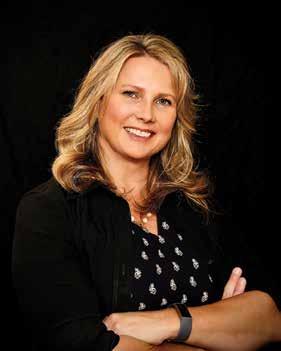
Bar Bulletin - December 28, 2022 - Volume 61, No. 24 35





Get started at lawpay.com/nmbar 888-726-7816 TOTAL: $1,500.00 New Case Reference **** **** **** 9995 *** Trust Payment IOLTA Deposit YOUR FIRM LOGO HERE PAY AT TORNEY PO WE R ED BY 22% increase in cash flow with online payments Vetted and approved by all 50 state bars, 70+ local and specialty bars, the ABA, and the ALA 62% of bills sent online are paid in 24 hours Data based on an average of firm accounts receivables increases using online billing solutions. LawPay is a registered agent of Wells Fargo Bank N.A., Concord, CA and Synovus Bank, Columbus, GA. Trusted by more than 150,000 professionals, LawPay is a simple, secure solution that allows you to easily accept credit and eCheck payments online, in person, or through your favorite practice management tools. I love LawPay! I’m not sure why I waited so long to get it set up. – Law Firm in Ohio + Member Benefit Provider



























 By Gina Constant
By Gina Constant


















































